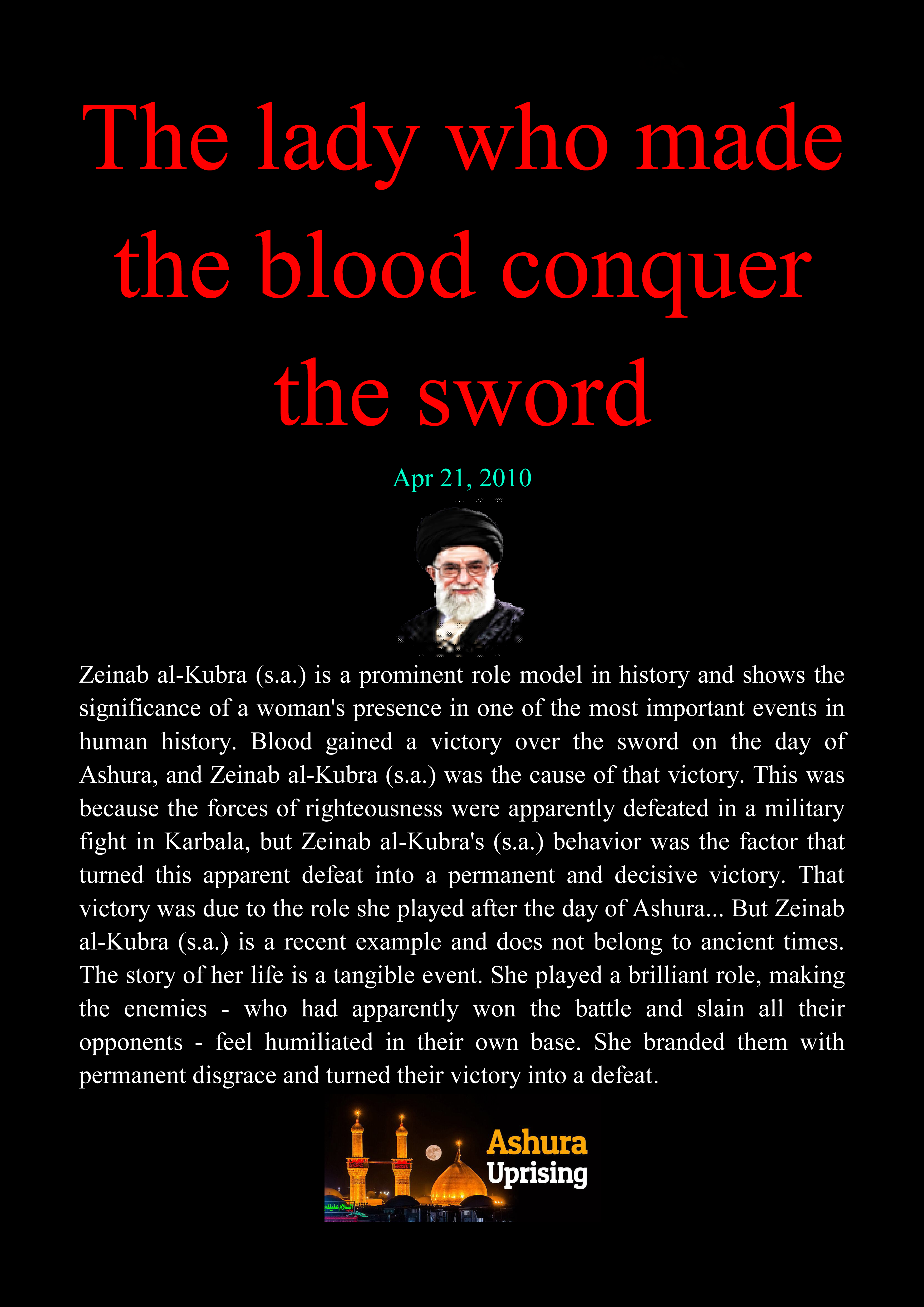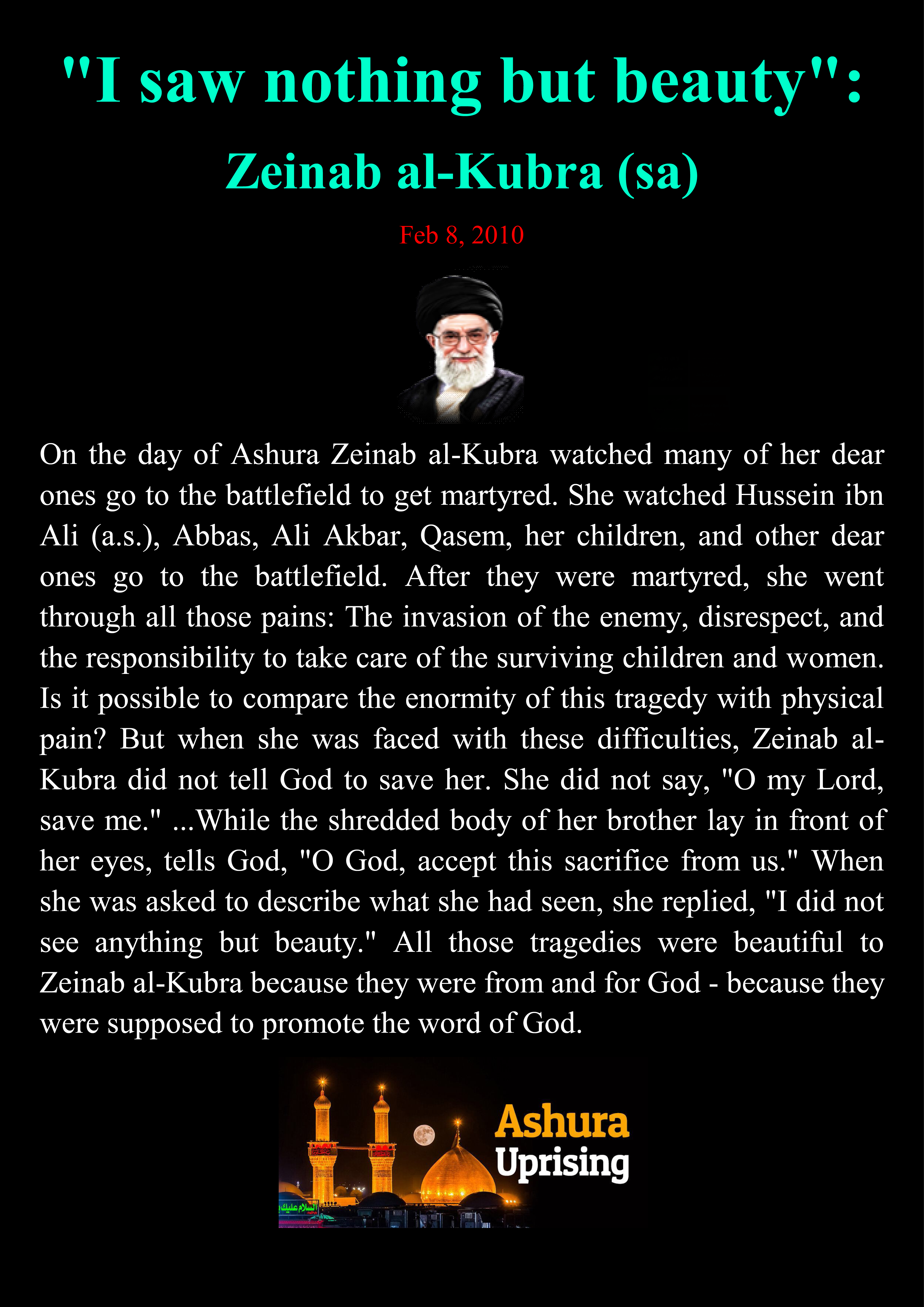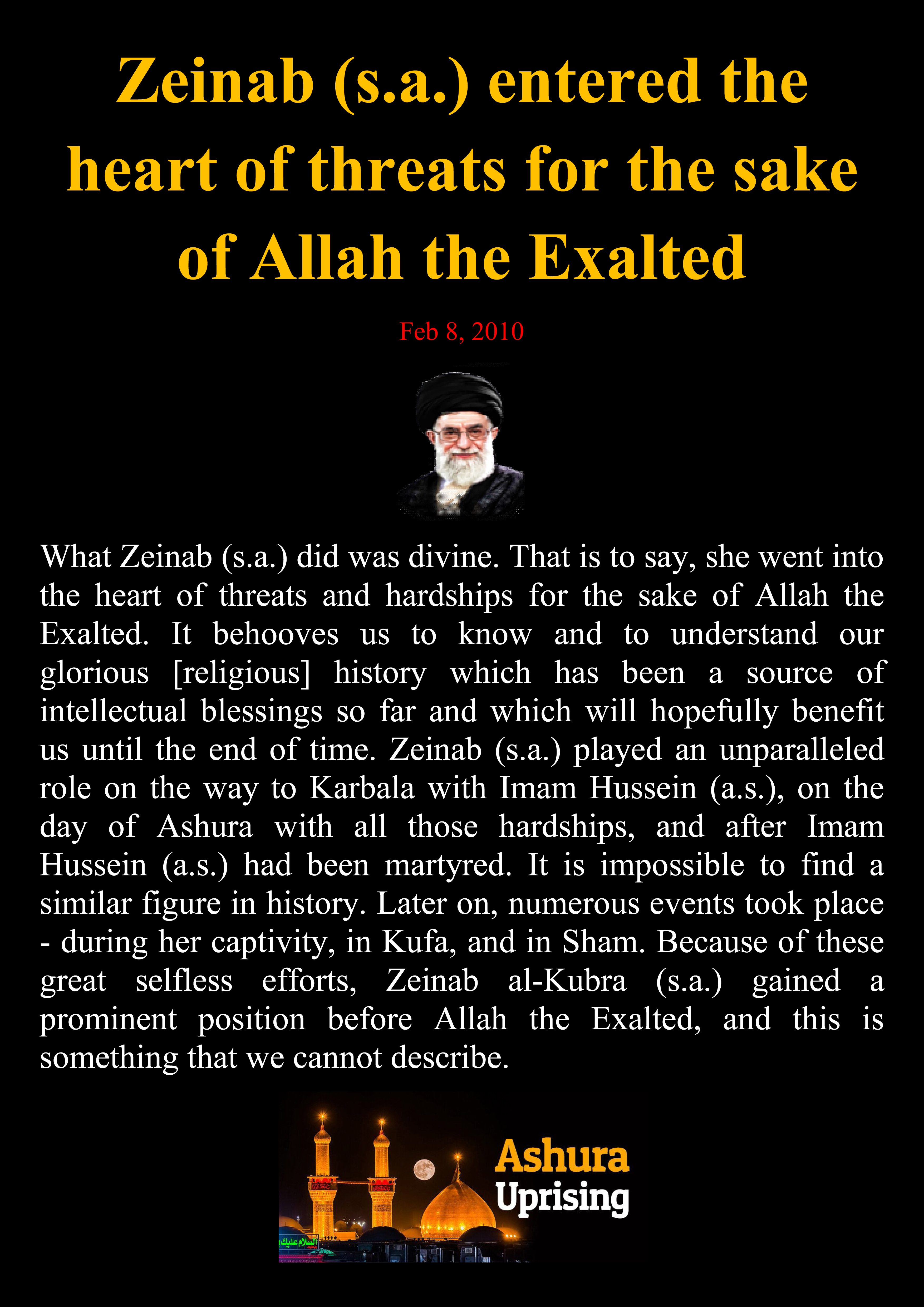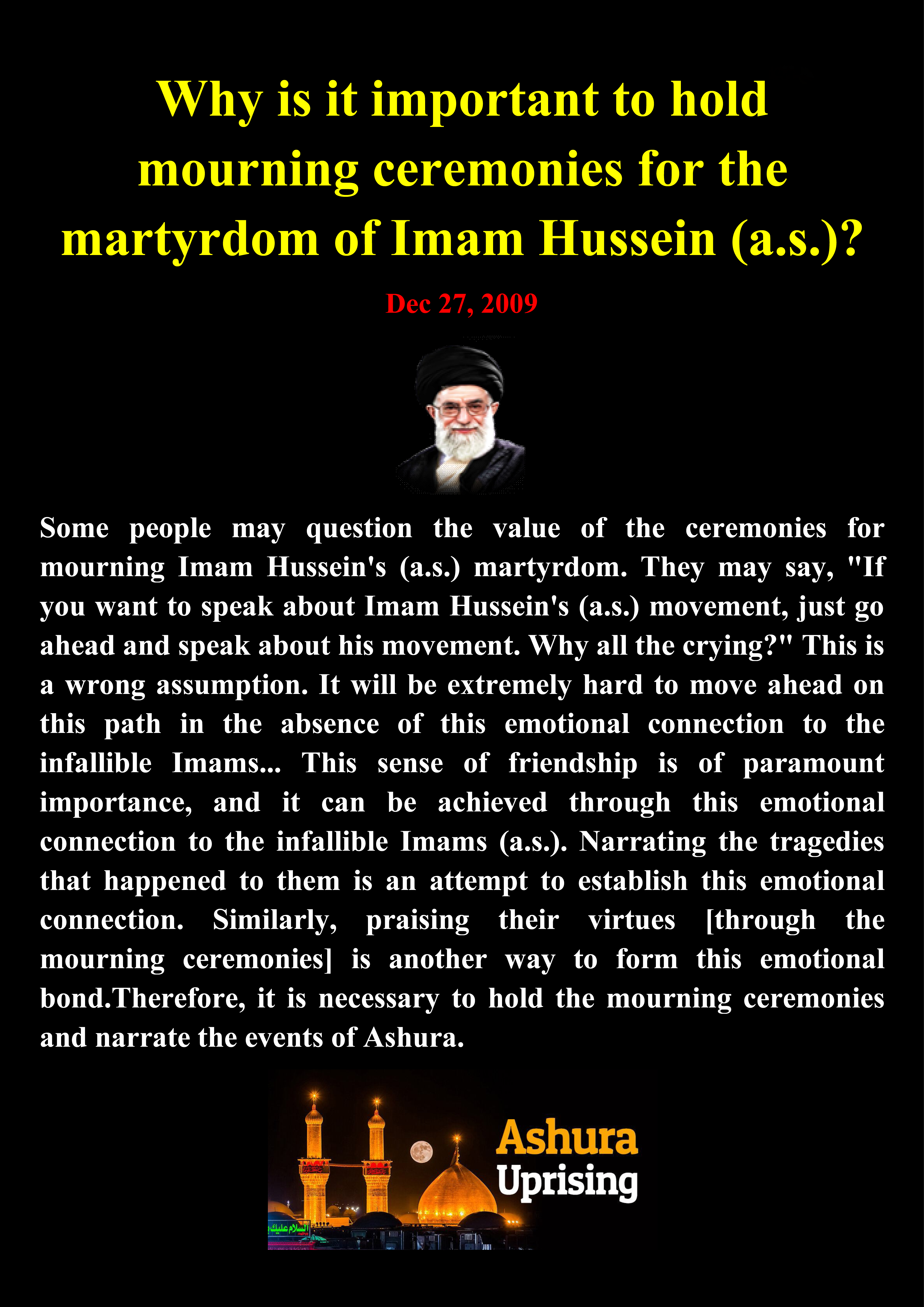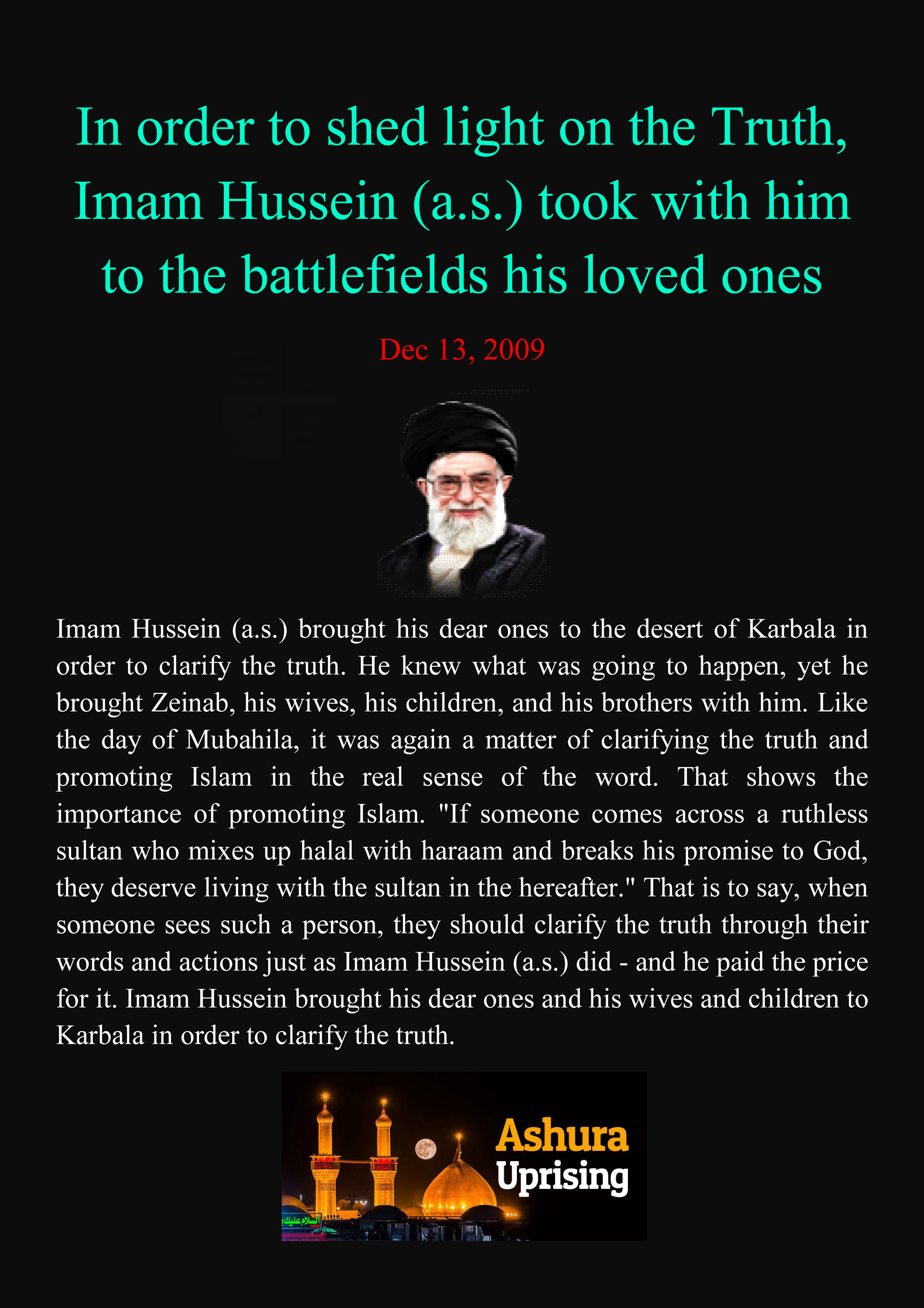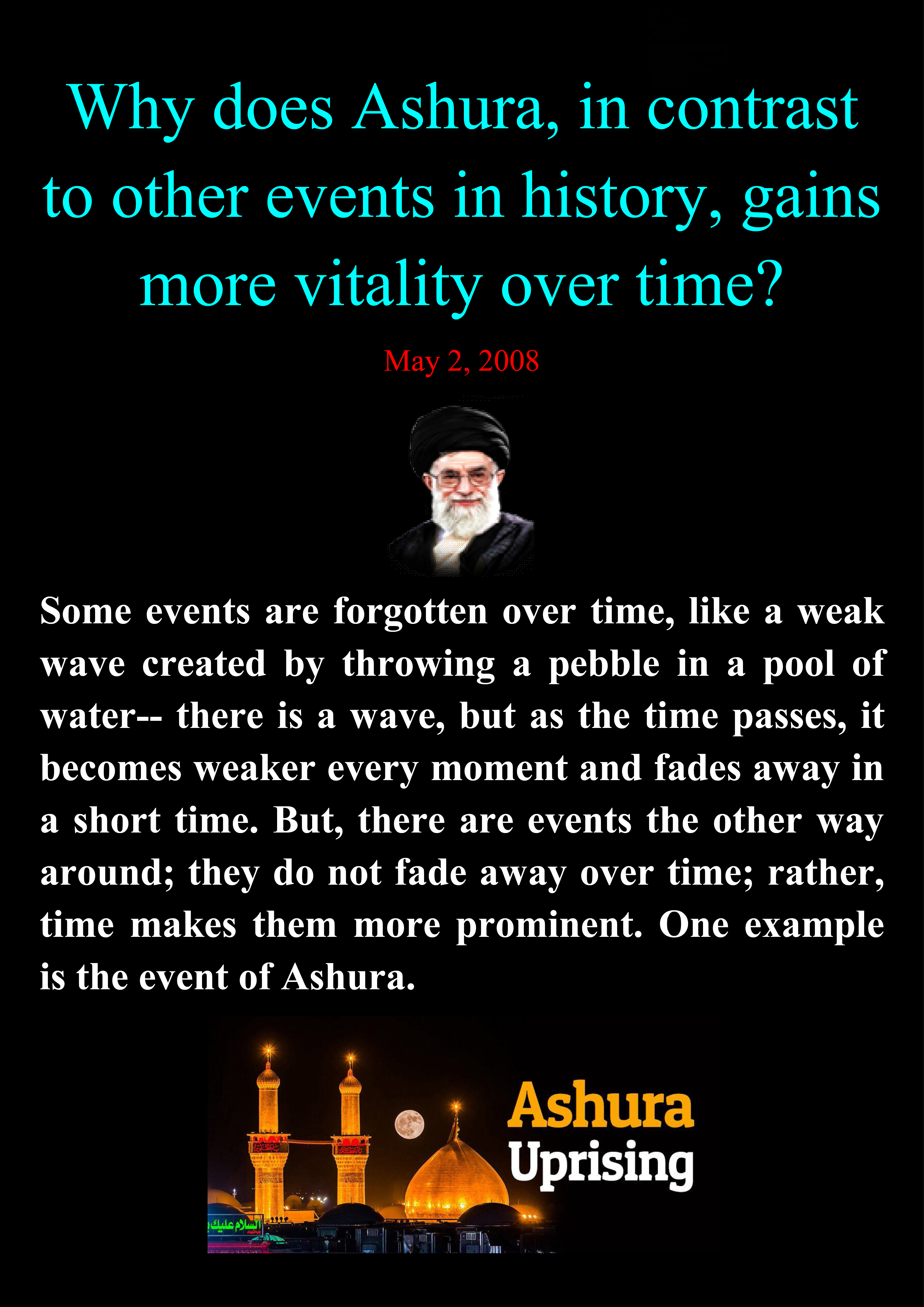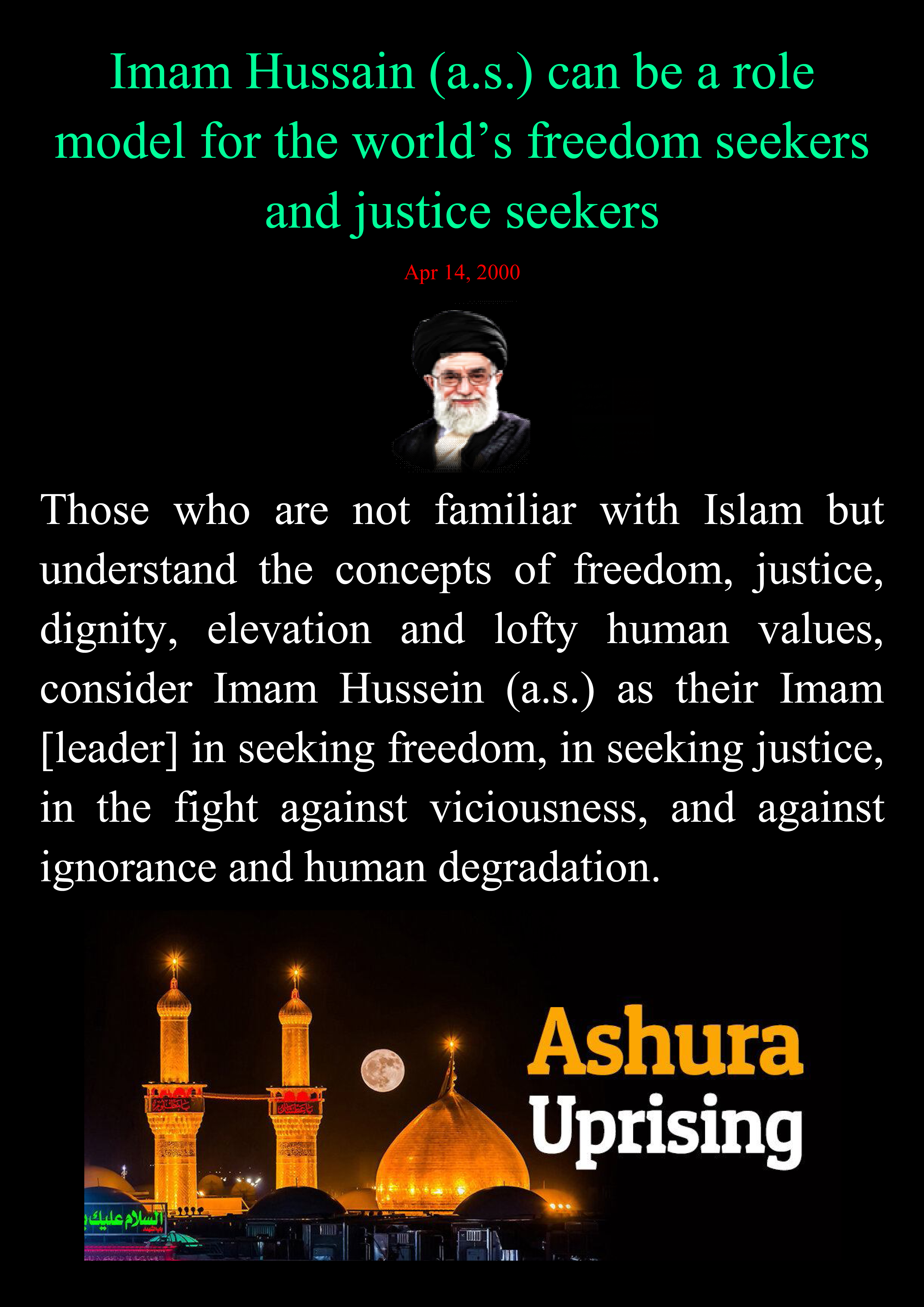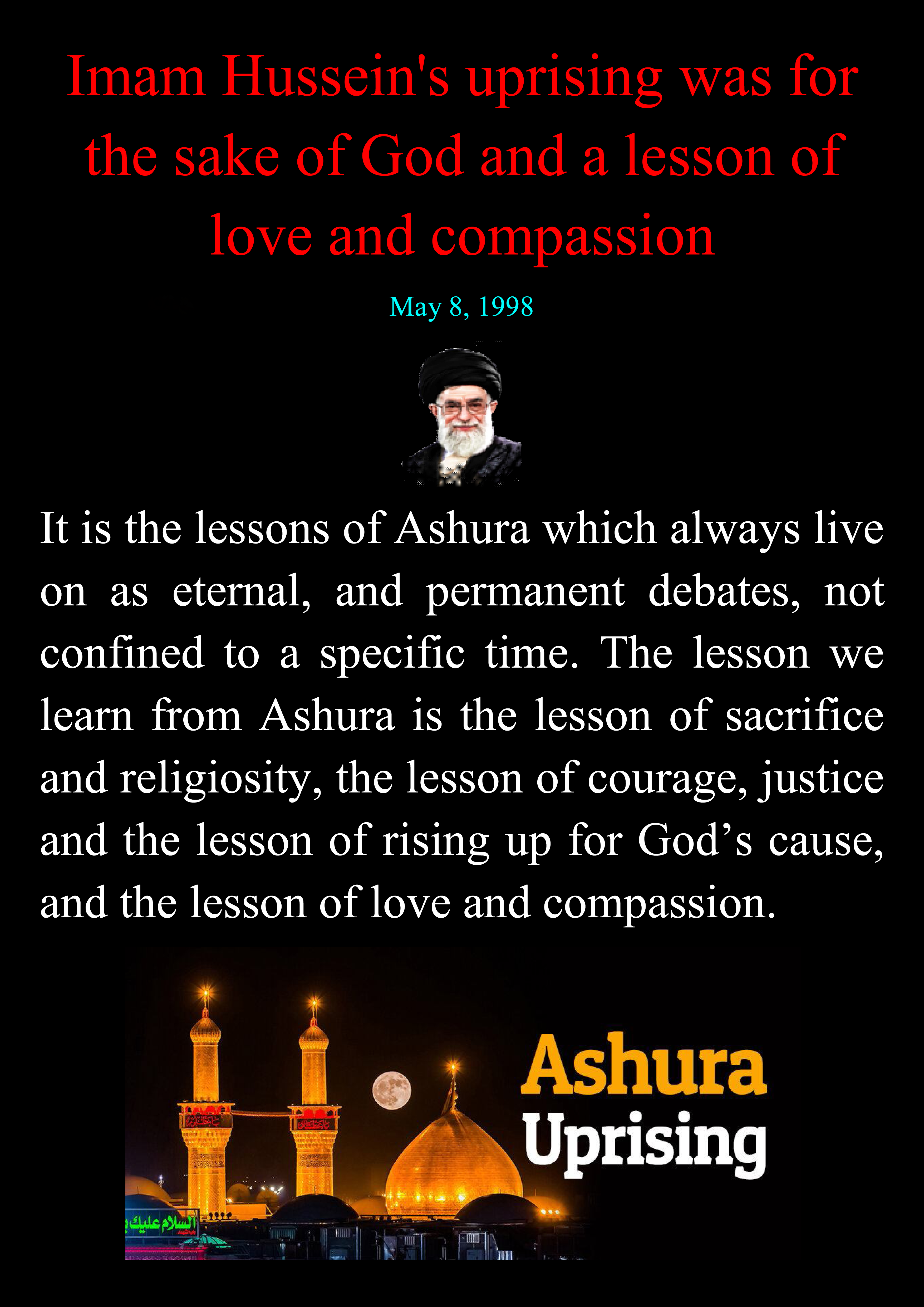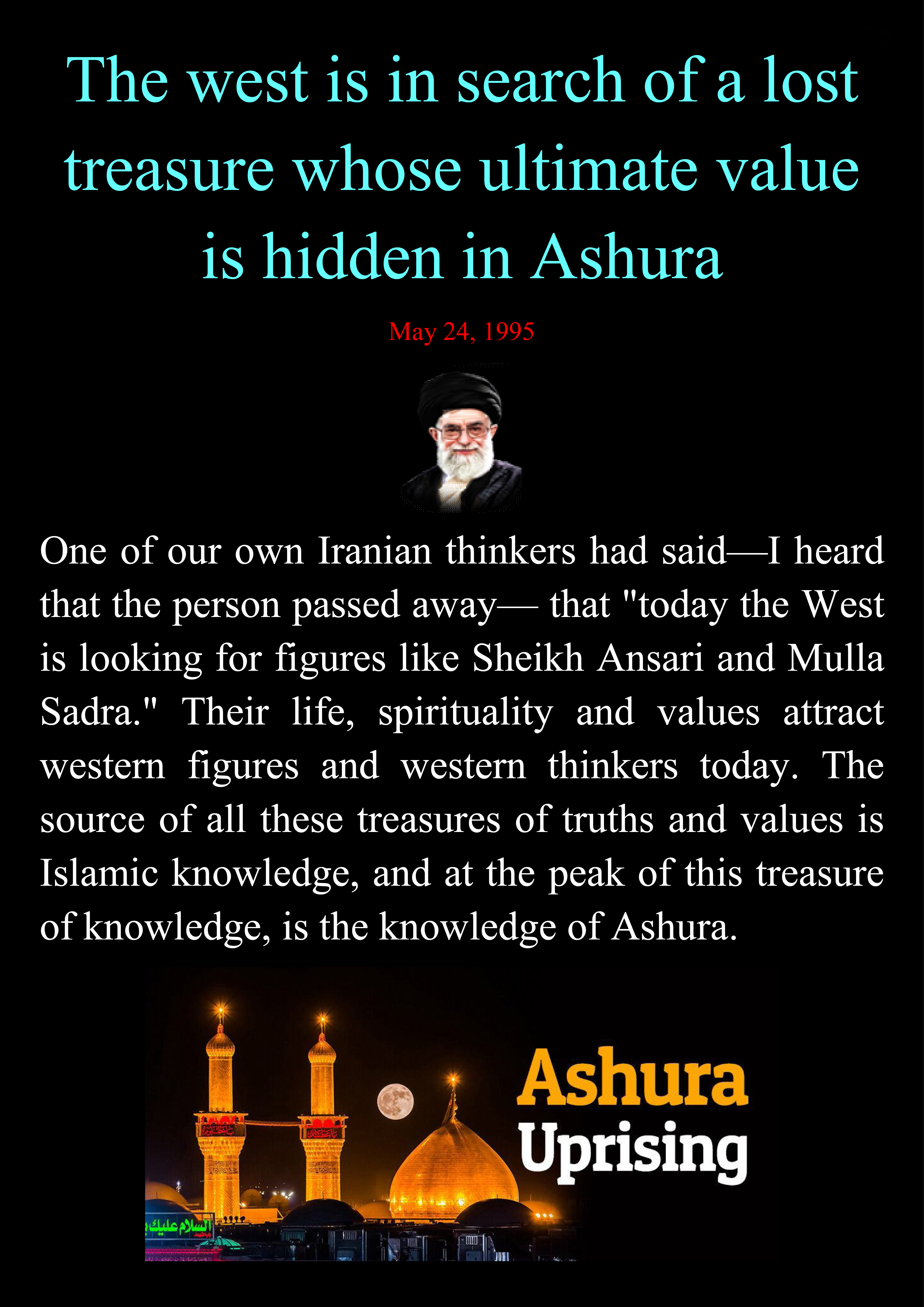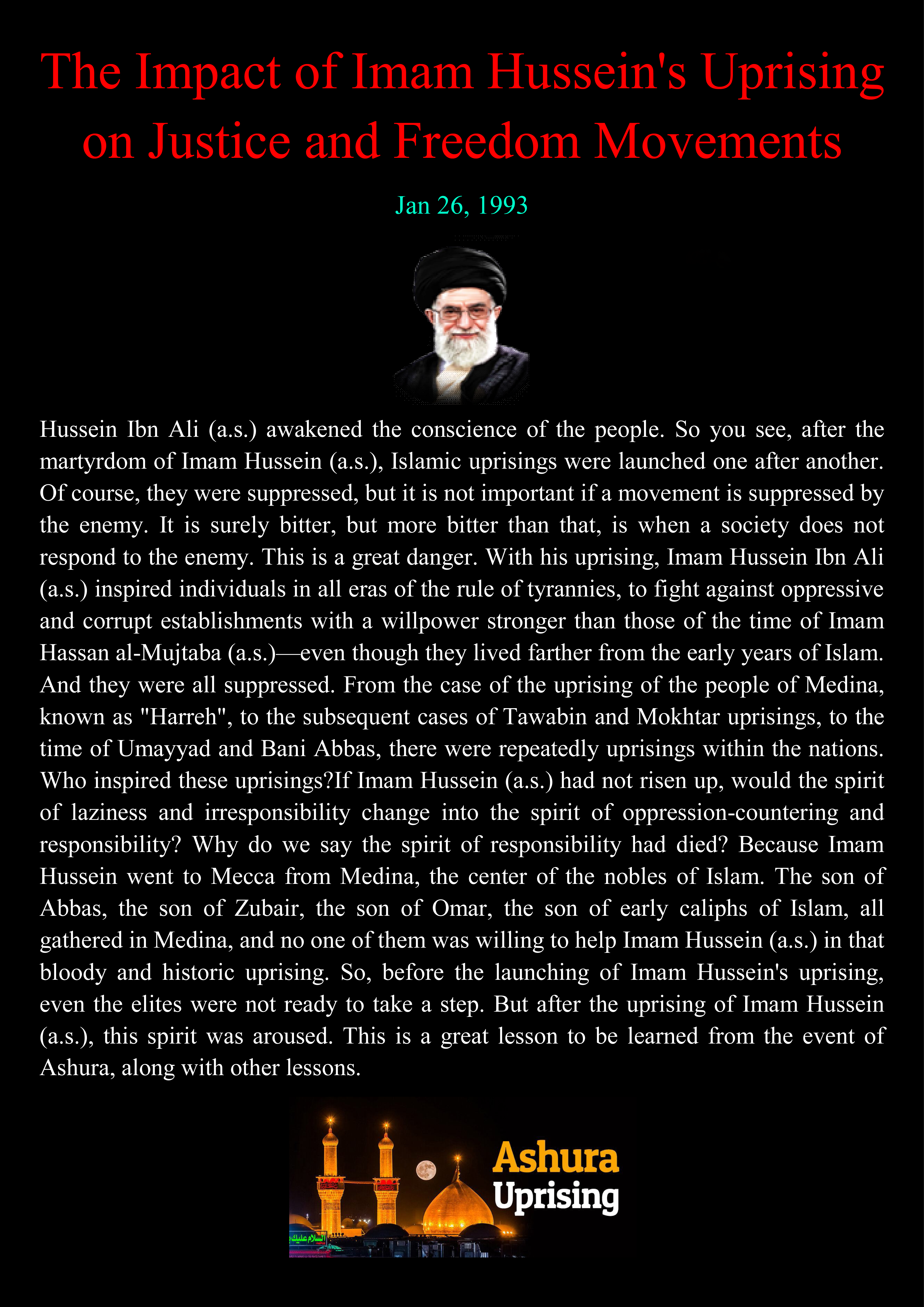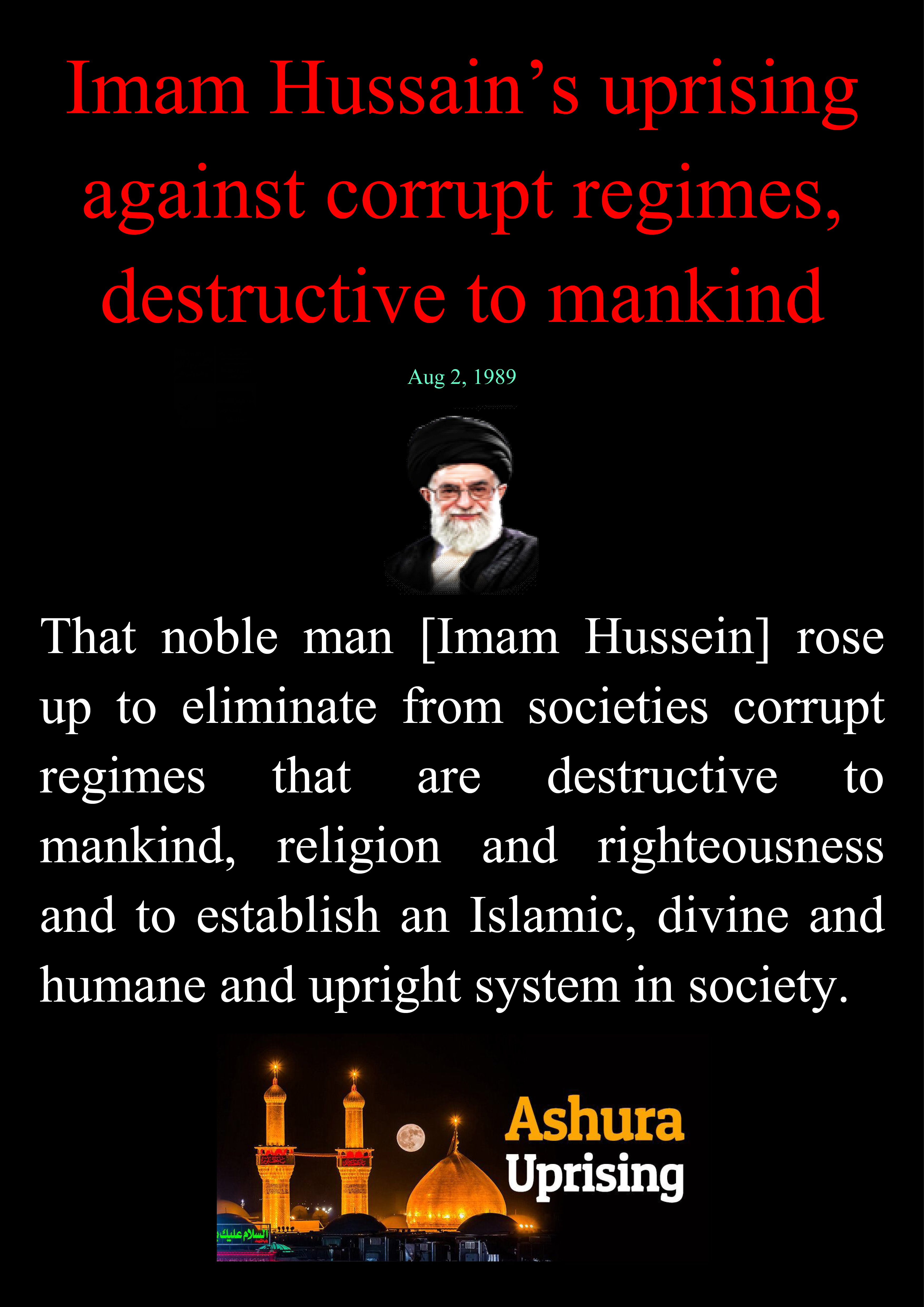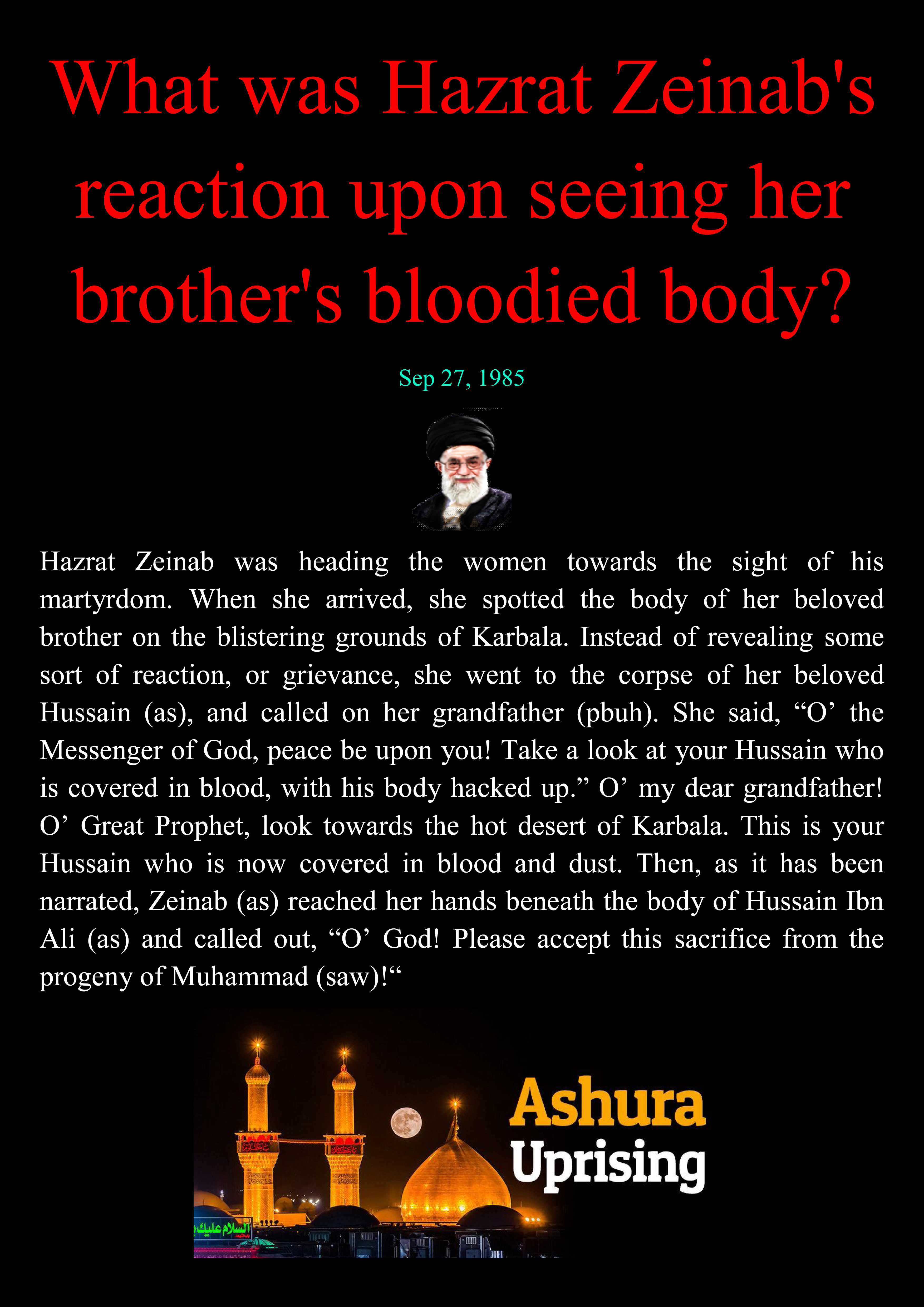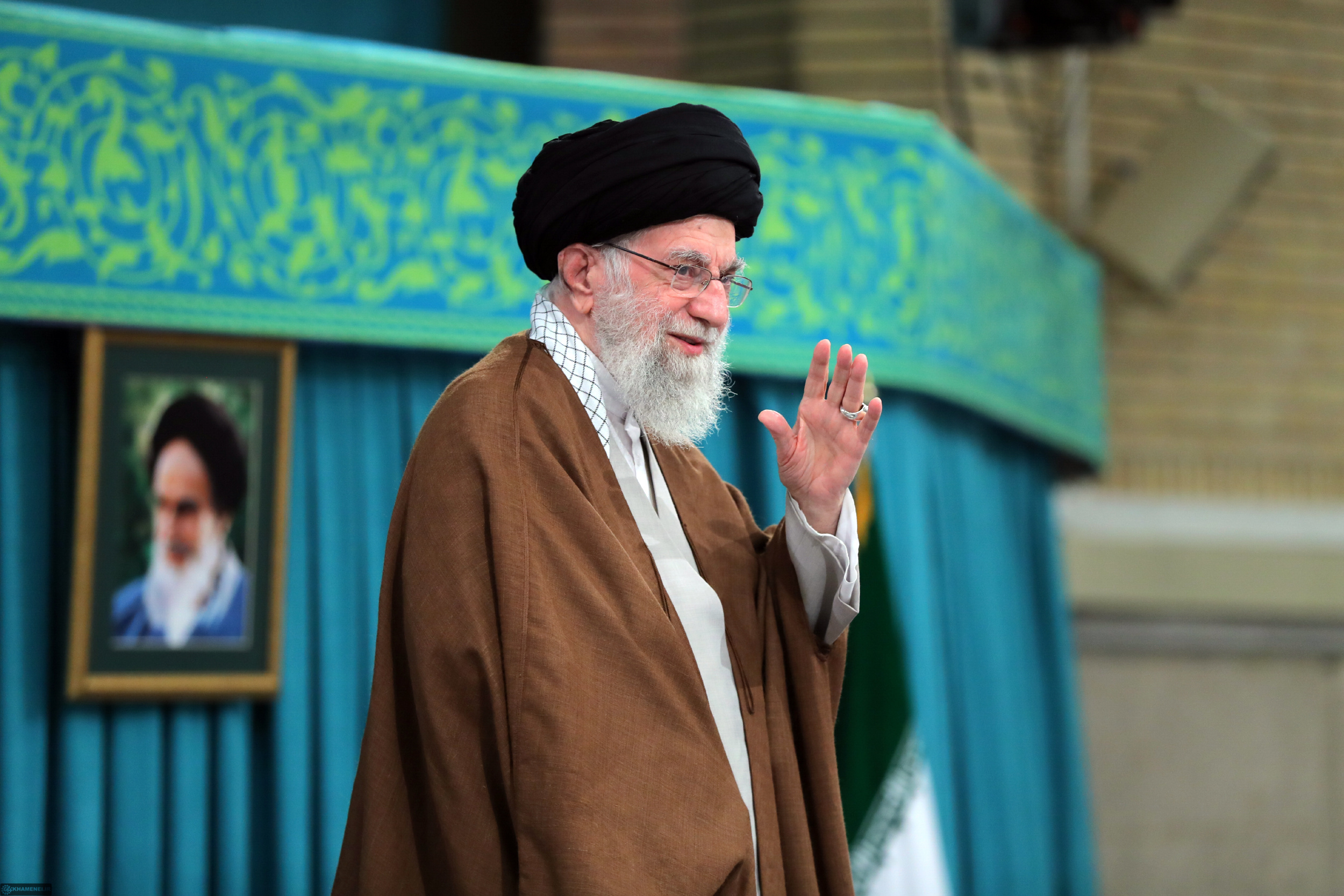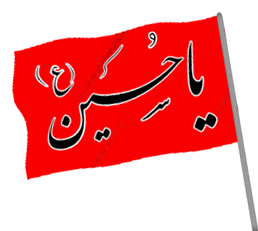Imam Hussein's uprising was for the sake of God and a lesson of love and compassion
- چهارشنبه, ۱۴ آذر ۱۴۰۳، ۰۴:۴۰ ب.ظ
In the Name of Allah, the Merciful, the Most Merciful
Sura 21: AL-ANBIYA (THE PROPHETS) - Juz' 17 - Translation Qarib
**************
Note: All content is free to use
Imam Hussain's (pbuh) Mubahala: Sacrificing his dearest ones to rise up on the path of God
Aug 30, 2020
The following are excerpts from a Dars-Kharij-Fiqh Lecture, delivered on the eve of Muharram on March 12, 2002, which are published for the first time.
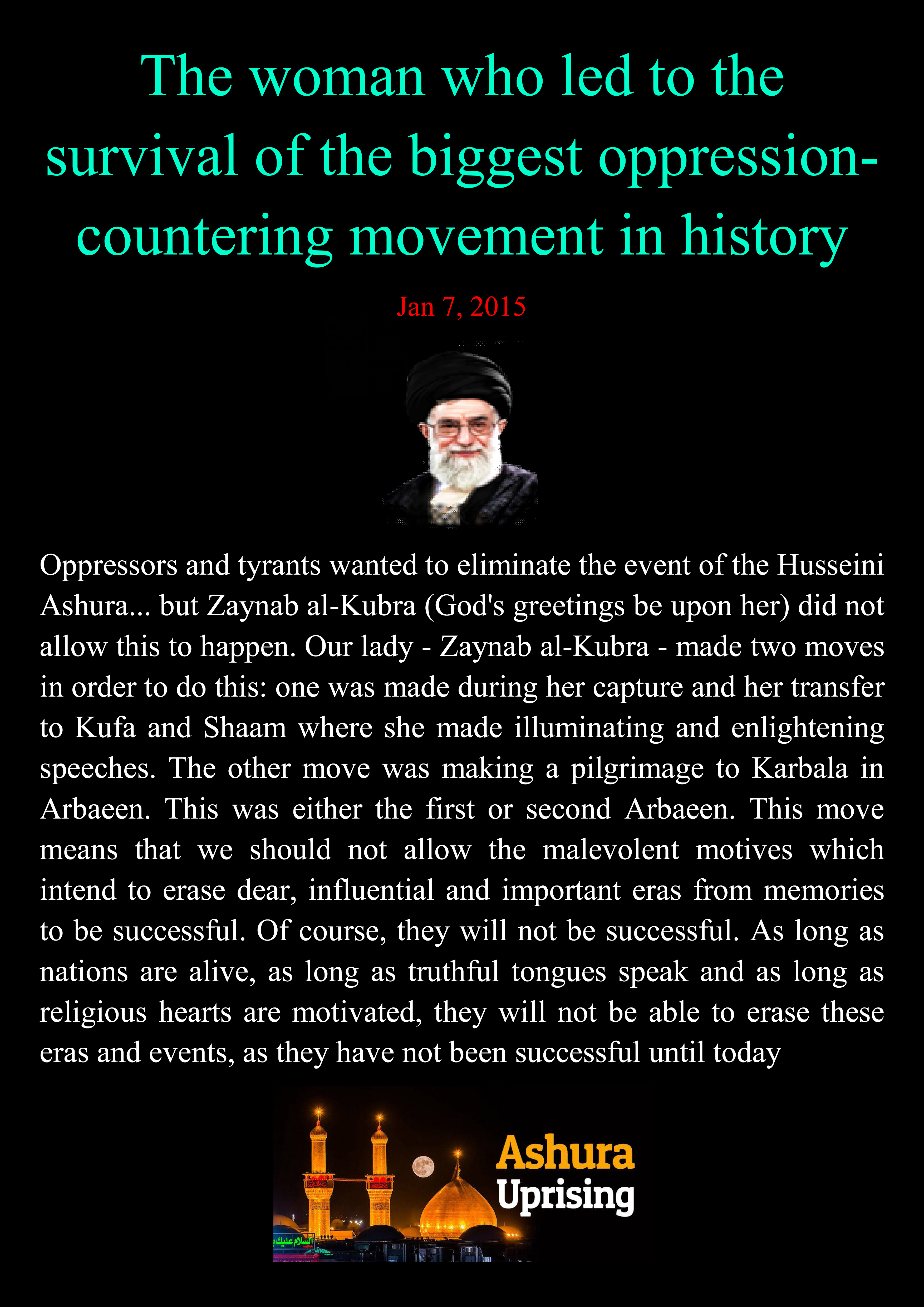
The woman who led to the survival of the biggest oppression-countering movement in history
Jan 7, 2015
Oppressors and tyrants wanted to eliminate the event of the Husseini Ashura... but Zaynab al-Kubra (God's greetings be upon her) did not allow this to happen. Our lady - Zaynab al-Kubra - made two moves in order to do this: one was made during her capture and her transfer to Kufa and Shaam where she made illuminating and enlightening speeches. The other move was making a pilgrimage to Karbala in Arbaeen. This was either the first or second Arbaeen. This move means that we should not allow the malevolent motives which intend to erase dear, influential and important eras from memories to be successful. Of course, they will not be successful. As long as nations are alive, as long as truthful tongues speak and as long as religious hearts are motivated, they will not be able to erase these eras and events, as they have not been successful until today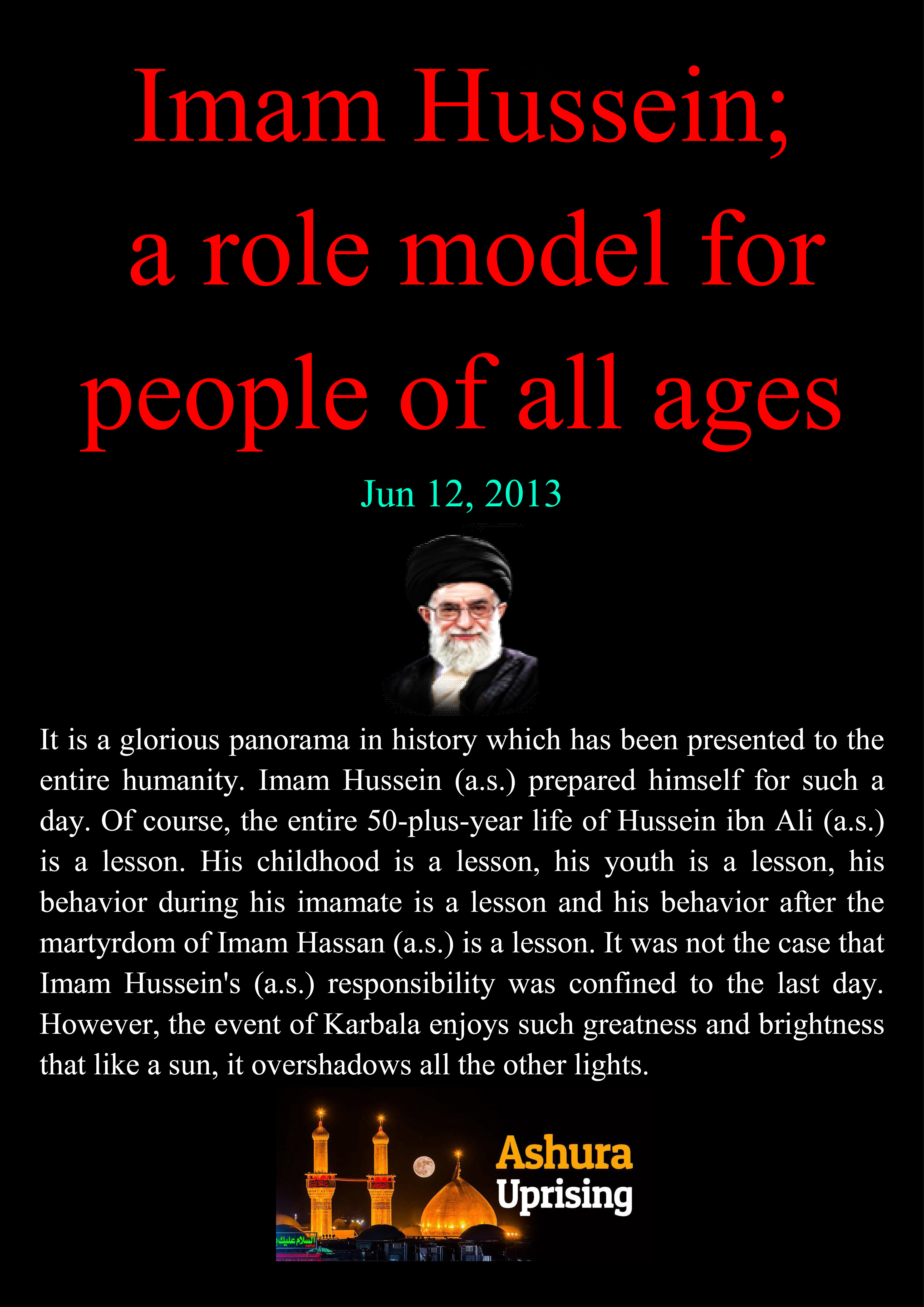
Imam Hussein; a role model for people of all ages
Jun 12, 2013
It is a glorious panorama in history which has been presented to the entire humanity. Imam Hussein (a.s.) prepared himself for such a day. Of course, the entire 50-plus-year life of Hussein ibn Ali (a.s.) is a lesson. His childhood is a lesson, his youth is a lesson, his behavior during his imamate is a lesson and his behavior after the martyrdom of Imam Hassan (a.s.) is a lesson. It was not the case that Imam Hussein's (a.s.) responsibility was confined to the last day. However, the event of Karbala enjoys such greatness and brightness that like a sun, it overshadows all the other lights.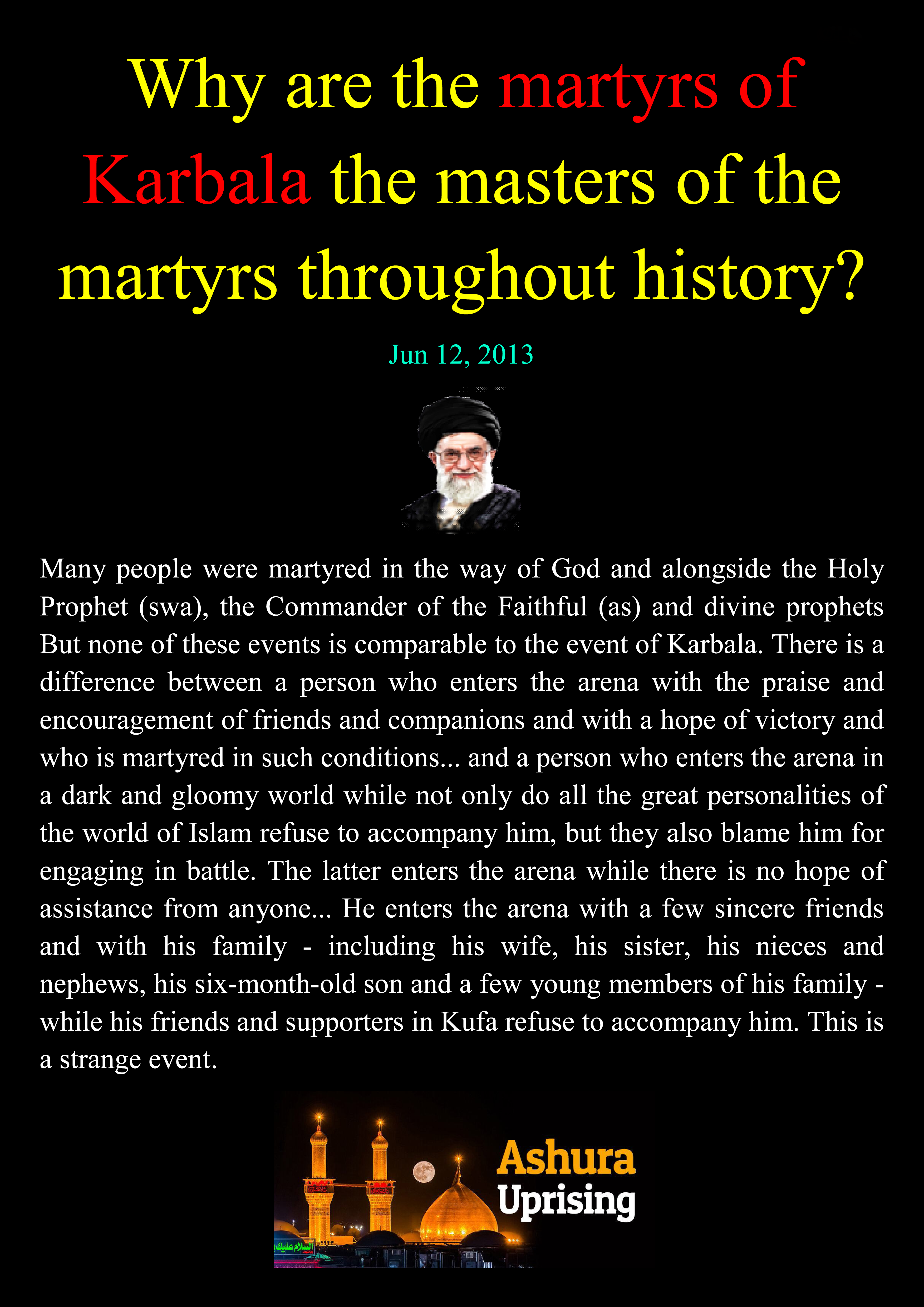
Why are the martyrs of Karbala the masters of the martyrs throughout history?
Jun 12, 2013
Many people were martyred in the way of God and alongside the Holy Prophet (swa), the Commander of the Faithful (as) and divine prophets But none of these events is comparable to the event of Karbala. There is a difference between a person who enters the arena with the praise and encouragement of friends and companions and with a hope of victory and who is martyred in such conditions... and a person who enters the arena in a dark and gloomy world while not only do all the great personalities of the world of Islam refuse to accompany him, but they also blame him for engaging in battle. The latter enters the arena while there is no hope of assistance from anyone... He enters the arena with a few sincere friends and with his family - including his wife, his sister, his nieces and nephews, his six-month-old son and a few young members of his family - while his friends and supporters in Kufa refuse to accompany him. This is a strange event.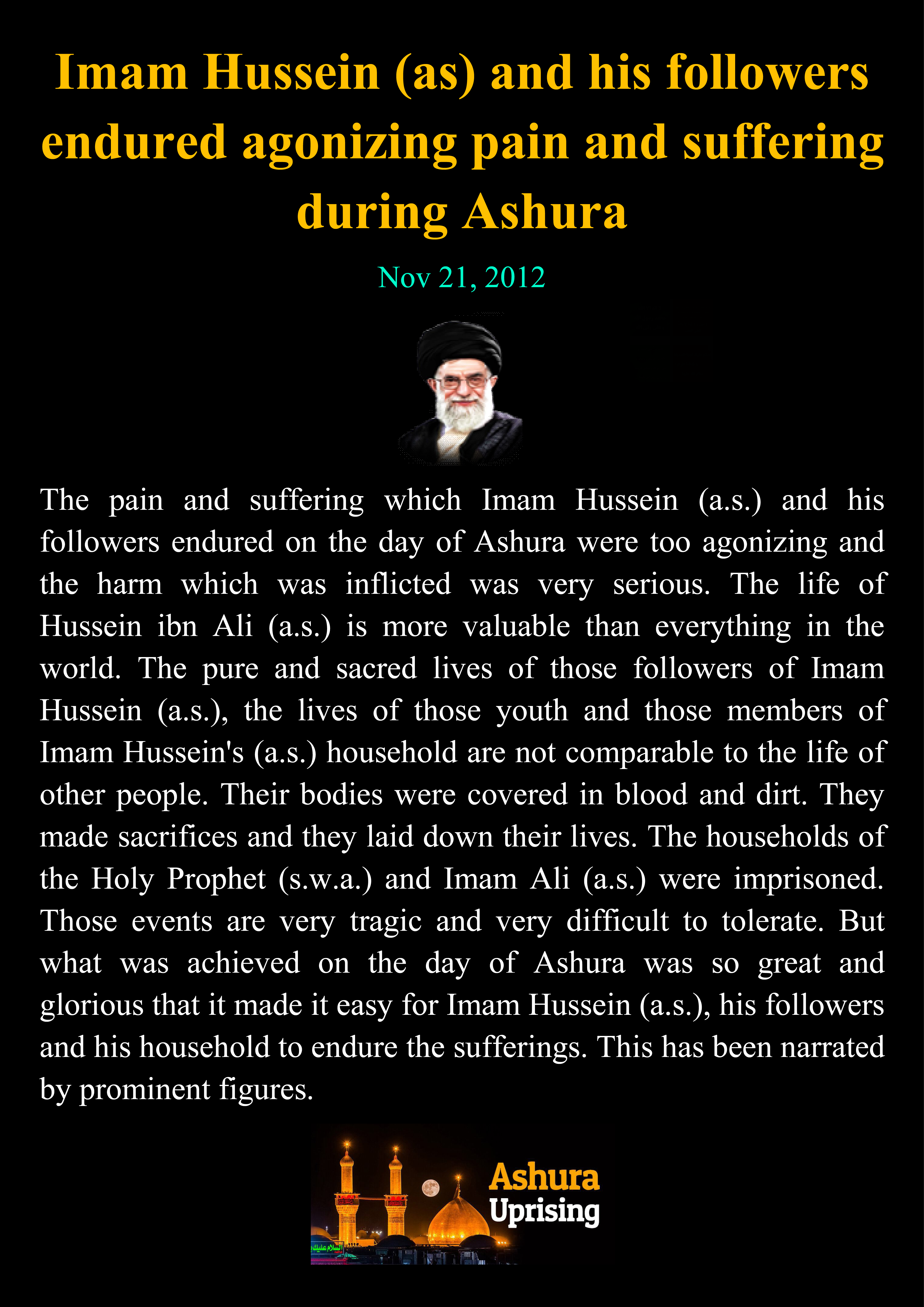
Imam Hussein (as) and his followers endured agonizing pain and suffering during Ashura
Nov 21, 2012
The pain and suffering which Imam Hussein (a.s.) and his followers endured on the day of Ashura were too agonizing and the harm which was inflicted was very serious. The life of Hussein ibn Ali (a.s.) is more valuable than everything in the world. The pure and sacred lives of those followers of Imam Hussein (a.s.), the lives of those youth and those members of Imam Hussein's (a.s.) household are not comparable to the life of other people. Their bodies were covered in blood and dirt. They made sacrifices and they laid down their lives. The households of the Holy Prophet (s.w.a.) and Imam Ali (a.s.) were imprisoned. Those events are very tragic and very difficult to tolerate. But what was achieved on the day of Ashura was so great and glorious that it made it easy for Imam Hussein (a.s.), his followers and his household to endure the sufferings. This has been narrated by prominent figures.
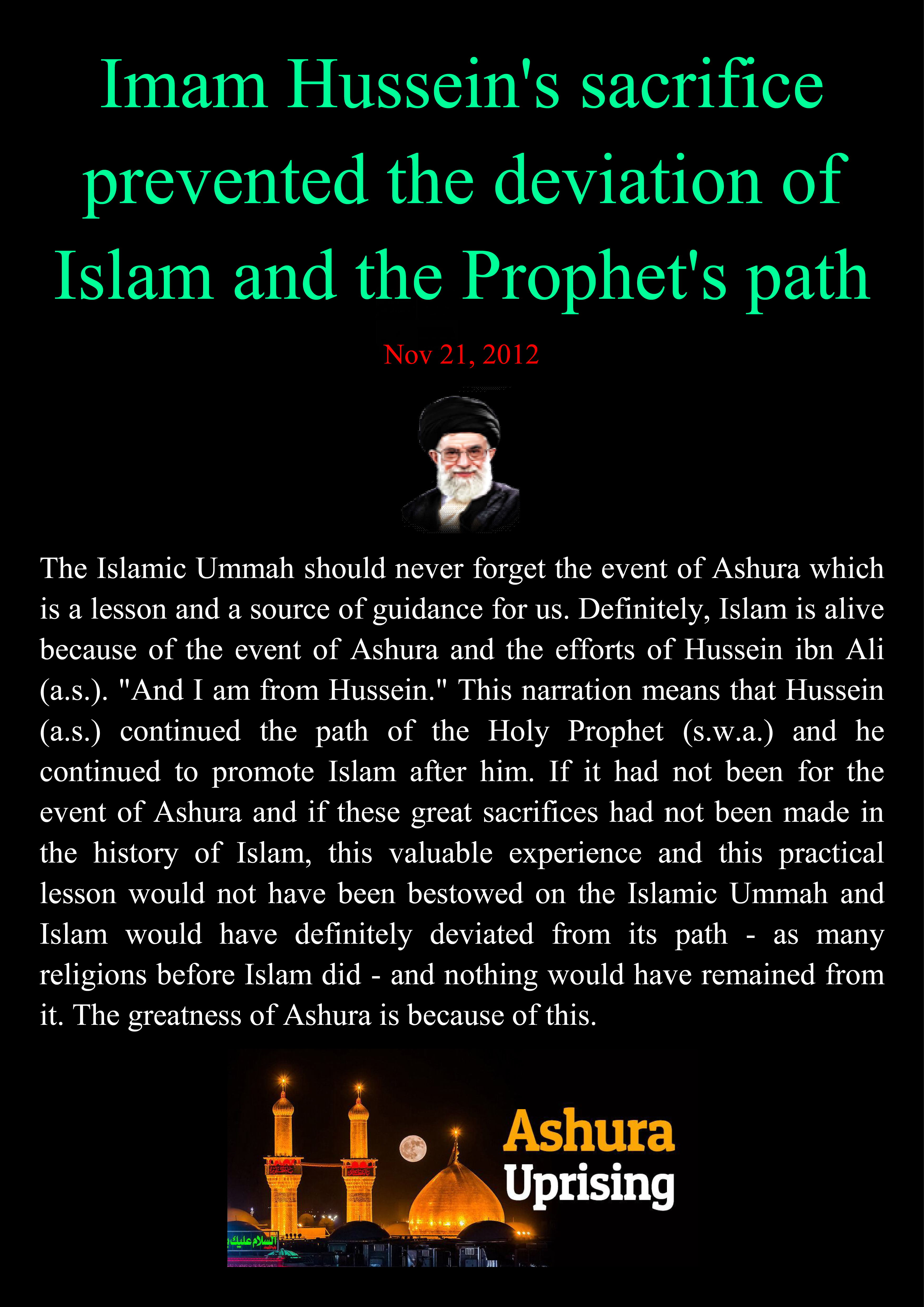
Imam Hussein's sacrifice prevented the deviation of Islam and the Prophet's path
Nov 21, 2012
The Islamic Ummah should never forget the event of Ashura which is a lesson and a source of guidance for us. Definitely, Islam is alive because of the event of Ashura and the efforts of Hussein ibn Ali (a.s.). "And I am from Hussein." This narration means that Hussein (a.s.) continued the path of the Holy Prophet (s.w.a.) and he continued to promote Islam after him. If it had not been for the event of Ashura and if these great sacrifices had not been made in the history of Islam, this valuable experience and this practical lesson would not have been bestowed on the Islamic Ummah and Islam would have definitely deviated from its path - as many religions before Islam did - and nothing would have remained from it. The greatness of Ashura is because of this.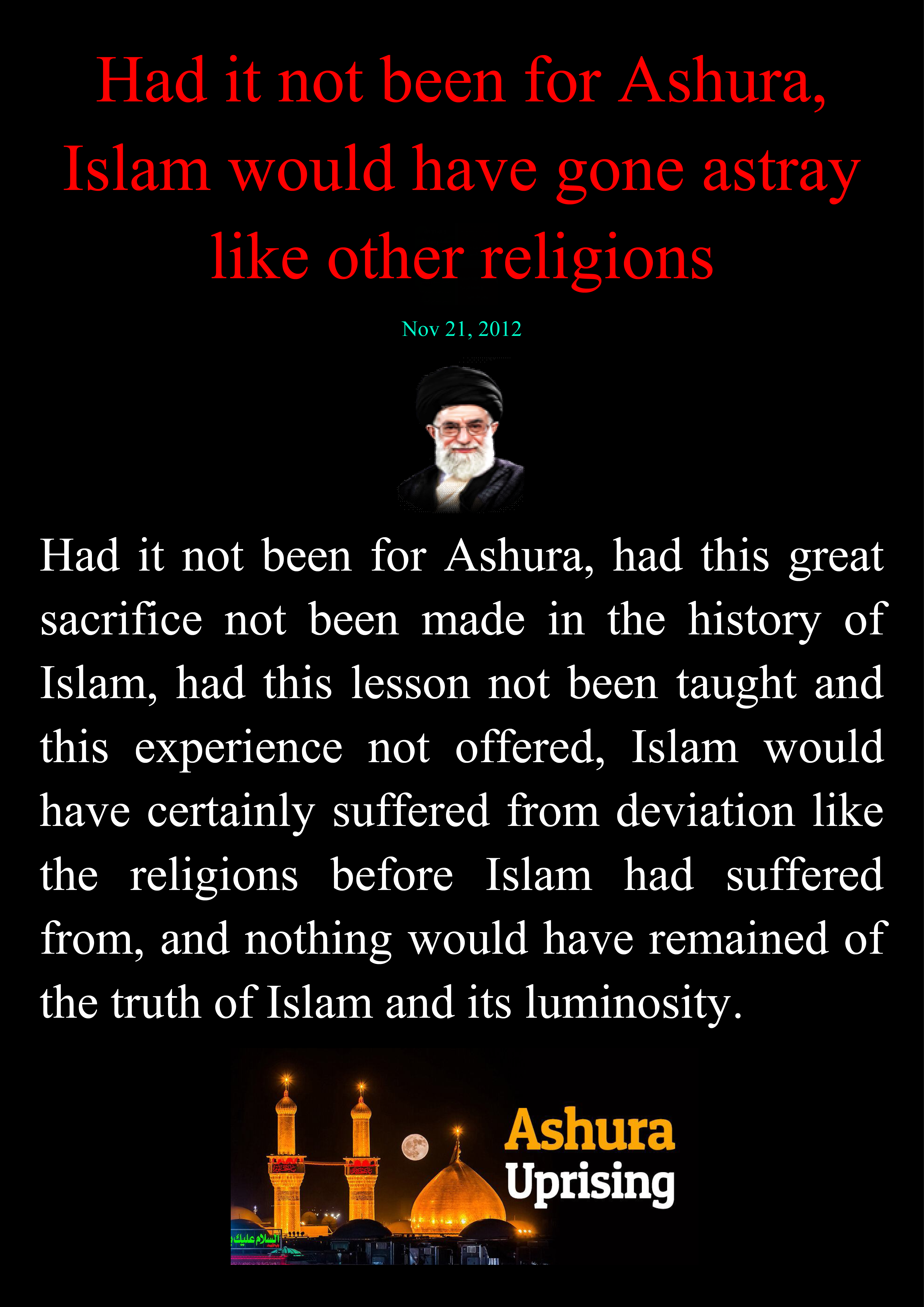
Had it not been for Ashura, Islam would have gone astray like other religions
Nov 21, 2012
Had it not been for Ashura, had this great sacrifice not been made in the history of Islam, had this lesson not been taught and this experience not offered, Islam would have certainly suffered from deviation like the religions before Islam had suffered from, and nothing would have remained of the truth of Islam and its luminosity._shohadaye_karbala_zdc2.png)
Imam Hussein rose up to proclaim the word of truth and save the people
Nov 27, 2011
The story didn't just end in the afternoon of Ashura; in fact, since the afternoon of Ashura, a movement started in history, which is still growing and expanding. It will be the same in the future, too. Imam Hussein (a.s.) did all in his power to proclaim the word of truth and to save the people. These are some of the traits that a person in general can see and show in the Ashura event.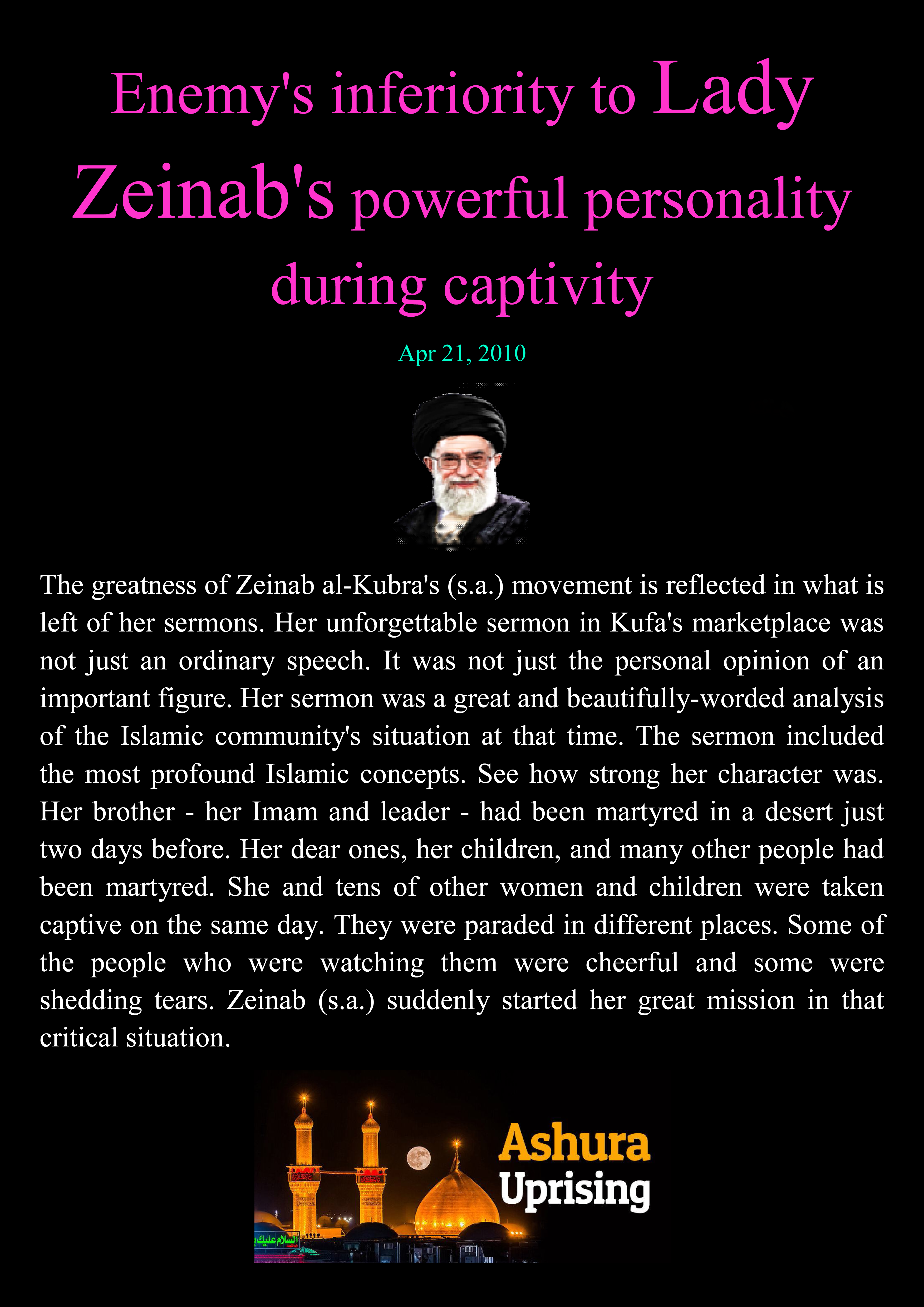
Enemy's inferiority to Lady Zeinab's powerful personality during captivity
Apr 21, 2010
The greatness of Zeinab al-Kubra's (s.a.) movement is reflected in what is left of her sermons. Her unforgettable sermon in Kufa's marketplace was not just an ordinary speech. It was not just the personal opinion of an important figure. Her sermon was a great and beautifully-worded analysis of the Islamic community's situation at that time. The sermon included the most profound Islamic concepts. See how strong her character was. Her brother - her Imam and leader - had been martyred in a desert just two days before. Her dear ones, her children, and many other people had been martyred. She and tens of other women and children were taken captive on the same day. They were paraded in different places. Some of the people who were watching them were cheerful and some were shedding tears. Zeinab (s.a.) suddenly started her great mission in that critical situation.
The lady who made the blood conquer the sword
Apr 21, 2010
Zeinab al-Kubra (s.a.) is a prominent role model in history and shows the significance of a woman's presence in one of the most important events in human history. Blood gained a victory over the sword on the day of Ashura, and Zeinab al-Kubra (s.a.) was the cause of that victory. This was because the forces of righteousness were apparently defeated in a military fight in Karbala, but Zeinab al-Kubra's (s.a.) behavior was the factor that turned this apparent defeat into a permanent and decisive victory. That victory was due to the role she played after the day of Ashura... But Zeinab al-Kubra (s.a.) is a recent example and does not belong to ancient times. The story of her life is a tangible event. She played a brilliant role, making the enemies - who had apparently won the battle and slain all their opponents - feel humiliated in their own base. She branded them with permanent disgrace and turned their victory into a defeat.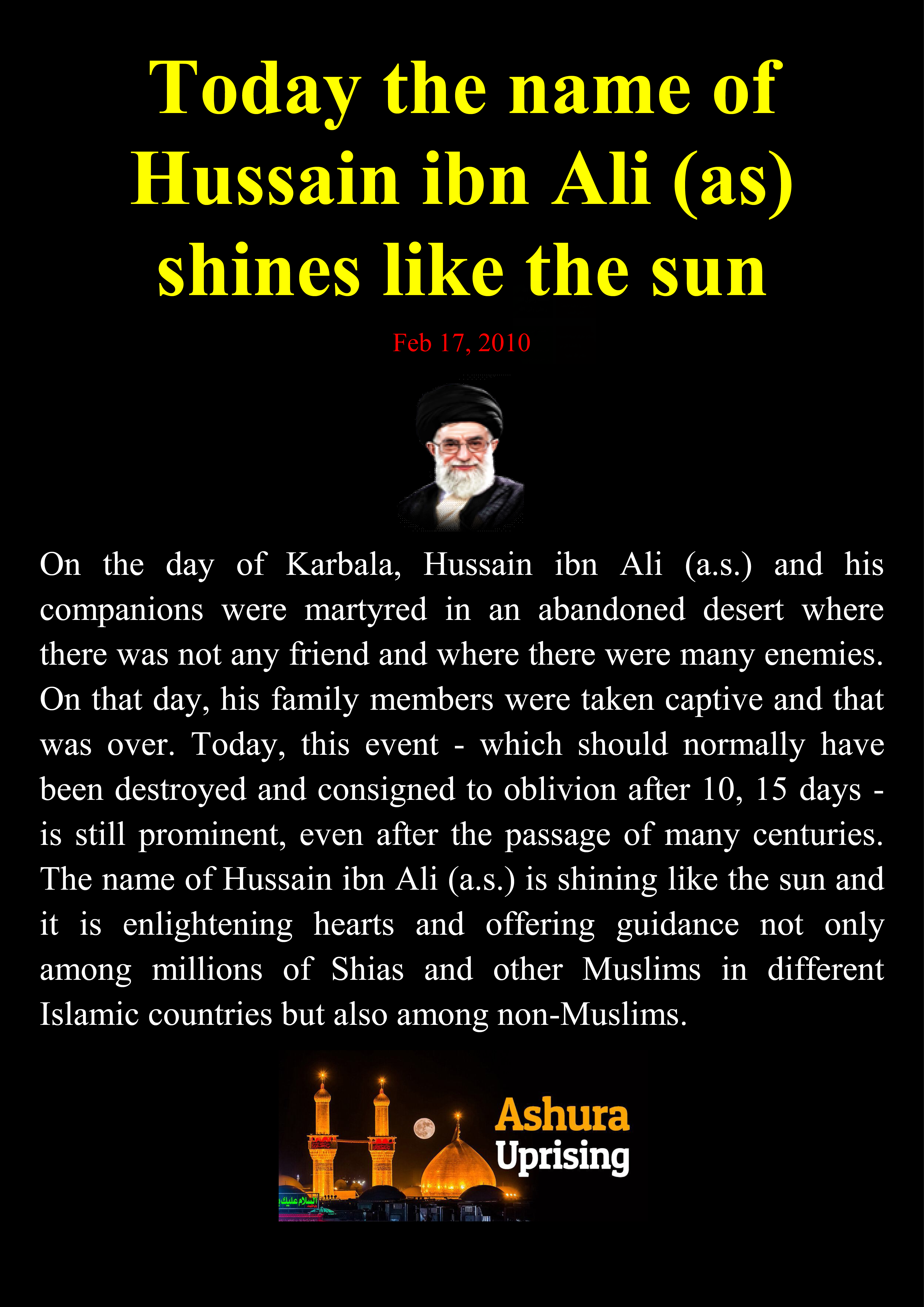
Today the name of Hussain ibn Ali (as) shines like the sun
Feb 17, 2010
On the day of Karbala, Hussain ibn Ali (a.s.) and his companions were martyred in an abandoned desert where there was not any friend and where there were many enemies. On that day, his family members were taken captive and that was over. Today, this event - which should normally have been destroyed and consigned to oblivion after 10, 15 days - is still prominent, even after the passage of many centuries. The name of Hussain ibn Ali (a.s.) is shining like the sun and it is enlightening hearts and offering guidance not only among millions of Shias and other Muslims in different Islamic countries but also among non-Muslims.
"I saw nothing but beauty": Zeinab al-Kubra (sa)
Feb 8, 2010
On the day of Ashura Zeinab al-Kubra watched many of her dear ones go to the battlefield to get martyred. She watched Hussein ibn Ali (a.s.), Abbas, Ali Akbar, Qasem, her children, and other dear ones go to the battlefield. After they were martyred, she went through all those pains: The invasion of the enemy, disrespect, and the responsibility to take care of the surviving children and women. Is it possible to compare the enormity of this tragedy with physical pain? But when she was faced with these difficulties, Zeinab al-Kubra did not tell God to save her. She did not say, "O my Lord, save me." ...While the shredded body of her brother lay in front of her eyes, tells God, "O God, accept this sacrifice from us." When she was asked to describe what she had seen, she replied, "I did not see anything but beauty." All those tragedies were beautiful to Zeinab al-Kubra because they were from and for God - because they were supposed to promote the word of God.
Zeinab (s.a.) entered the heart of threats for the sake of Allah the Exalted
Feb 8, 2010
What Zeinab (s.a.) did was divine. That is to say, she went into the heart of threats and hardships for the sake of Allah the Exalted. It behooves us to know and to understand our glorious [religious] history which has been a source of intellectual blessings so far and which will hopefully benefit us until the end of time. Zeinab (s.a.) played an unparalleled role on the way to Karbala with Imam Hussein (a.s.), on the day of Ashura with all those hardships, and after Imam Hussein (a.s.) had been martyred. It is impossible to find a similar figure in history. Later on, numerous events took place - during her captivity, in Kufa, and in Sham. Because of these great selfless efforts, Zeinab al-Kubra (s.a.) gained a prominent position before Allah the Exalted, and this is something that we cannot describe.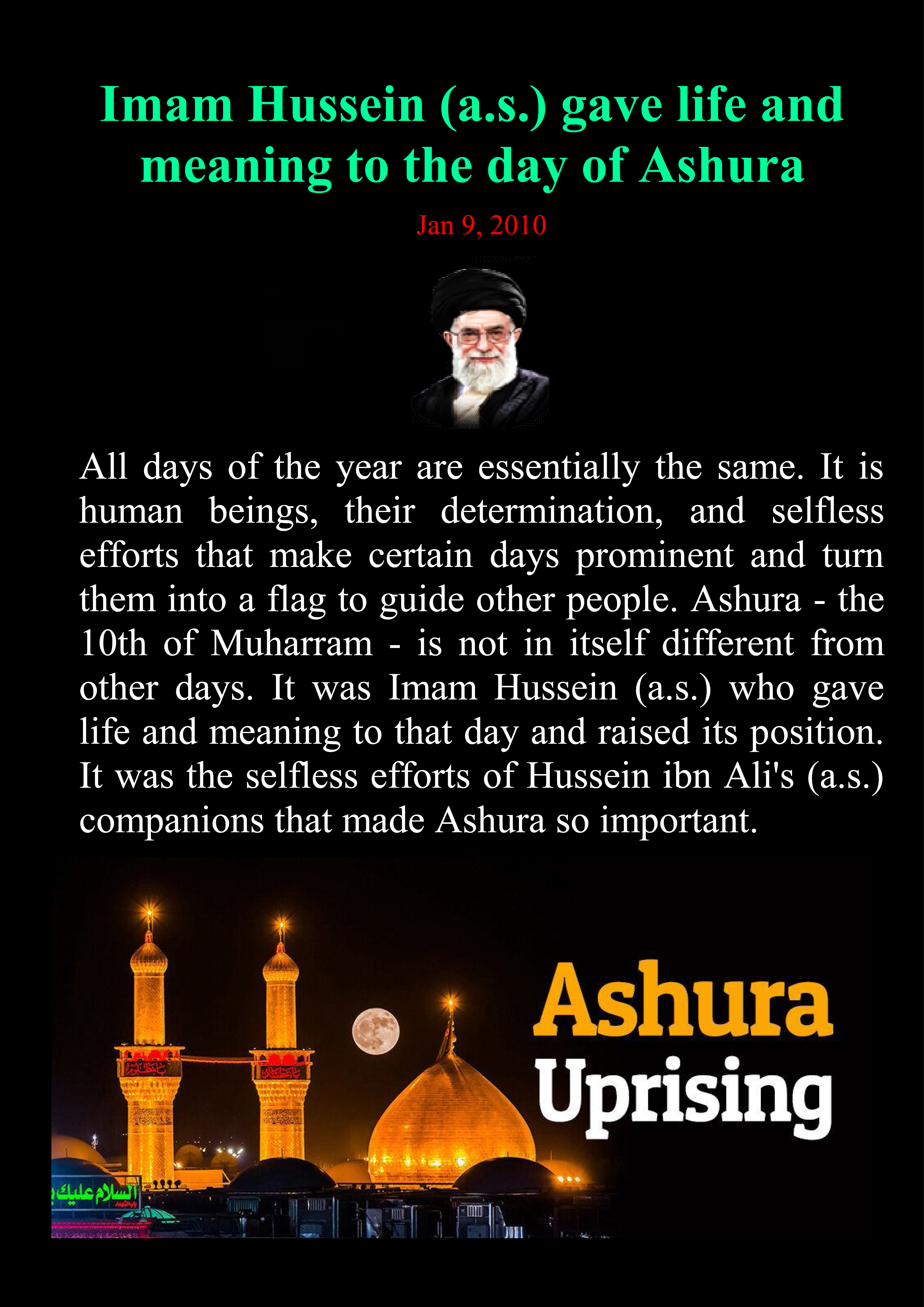
Imam Hussein (a.s.) gave life and meaning to the day of Ashura
Jan 9, 2010
All days of the year are essentially the same. It is human beings, their determination, and selfless efforts that make certain days prominent and turn them into a flag to guide other people. Ashura - the 10th of Muharram - is not in itself different from other days. It was Imam Hussein (a.s.) who gave life and meaning to that day and raised its position. It was the selfless efforts of Hussein ibn Ali's (a.s.) companions that made Ashura so important.
Why is it important to hold mourning ceremonies for the martyrdom of Imam Hussein (a.s.)?
Dec 27, 2009
Some people may question the value of the ceremonies for mourning Imam Hussein's (a.s.) martyrdom. They may say, "If you want to speak about Imam Hussein's (a.s.) movement, just go ahead and speak about his movement. Why all the crying?" This is a wrong assumption. It will be extremely hard to move ahead on this path in the absence of this emotional connection to the infallible Imams... This sense of friendship is of paramount importance, and it can be achieved through this emotional connection to the infallible Imams (a.s.). Narrating the tragedies that happened to them is an attempt to establish this emotional connection. Similarly, praising their virtues [through the mourning ceremonies] is another way to form this emotional bond.Therefore, it is necessary to hold the mourning ceremonies and narrate the events of Ashura.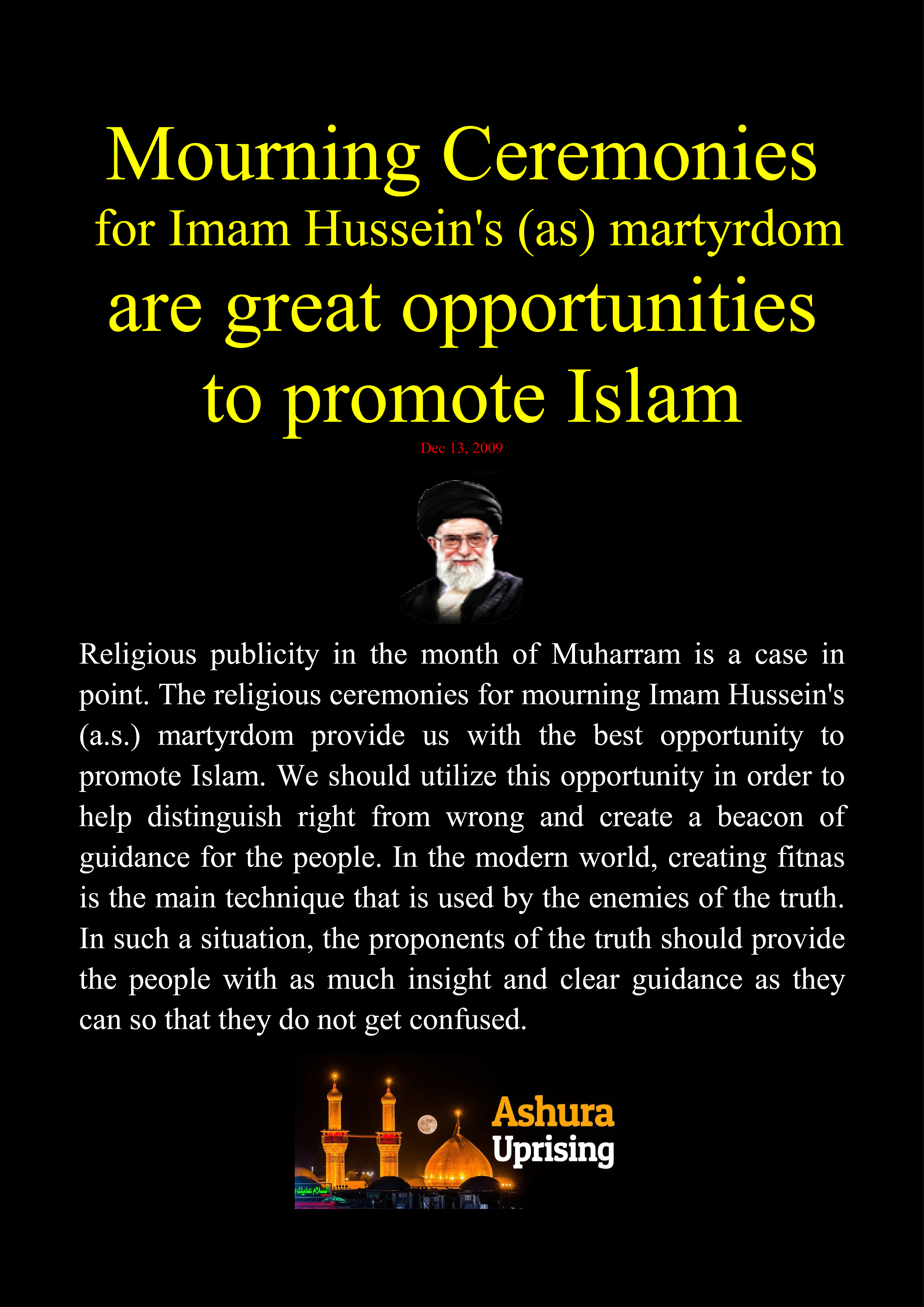
Mourning Ceremonies for Imam Hussein's (as) martyrdom are great opportunities to promote Islam
Dec 13, 2009
Religious publicity in the month of Muharram is a case in point. The religious ceremonies for mourning Imam Hussein's (a.s.) martyrdom provide us with the best opportunity to promote Islam. We should utilize this opportunity in order to help distinguish right from wrong and create a beacon of guidance for the people. In the modern world, creating fitnas is the main technique that is used by the enemies of the truth. In such a situation, the proponents of the truth should provide the people with as much insight and clear guidance as they can so that they do not get confused.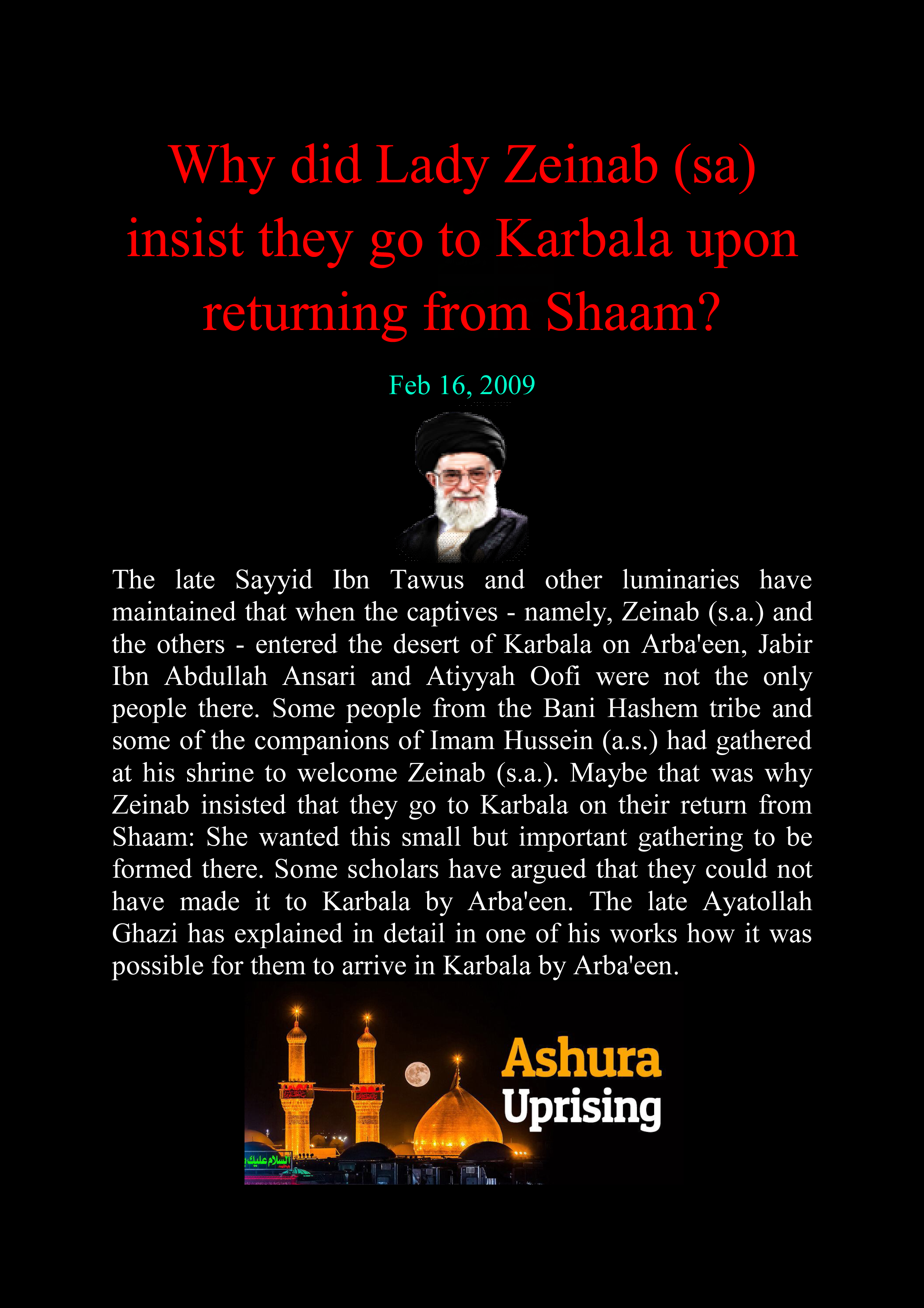
Why did Lady Zeinab (sa) insist they go to Karbala upon returning from Shaam?
Feb 16, 2009
The late Sayyid Ibn Tawus and other luminaries have maintained that when the captives - namely, Zeinab (s.a.) and the others - entered the desert of Karbala on Arba'een, Jabir Ibn Abdullah Ansari and Atiyyah Oofi were not the only people there. Some people from the Bani Hashem tribe and some of the companions of Imam Hussein (a.s.) had gathered at his shrine to welcome Zeinab (s.a.). Maybe that was why Zeinab insisted that they go to Karbala on their return from Shaam: She wanted this small but important gathering to be formed there. Some scholars have argued that they could not have made it to Karbala by Arba'een. The late Ayatollah Ghazi has explained in detail in one of his works how it was possible for them to arrive in Karbala by Arba'een.
In order to shed light on the Truth, Imam Hussein (a.s.) took with him to the battlefields his loved ones
Dec 13, 2009
Imam Hussein (a.s.) brought his dear ones to the desert of Karbala in order to clarify the truth. He knew what was going to happen, yet he brought Zeinab, his wives, his children, and his brothers with him. Like the day of Mubahila, it was again a matter of clarifying the truth and promoting Islam in the real sense of the word. That shows the importance of promoting Islam. "If someone comes across a ruthless sultan who mixes up halal with haraam and breaks his promise to God, they deserve living with the sultan in the hereafter." That is to say, when someone sees such a person, they should clarify the truth through their words and actions just as Imam Hussein (a.s.) did - and he paid the price for it. Imam Hussein brought his dear ones and his wives and children to Karbala in order to clarify the truth.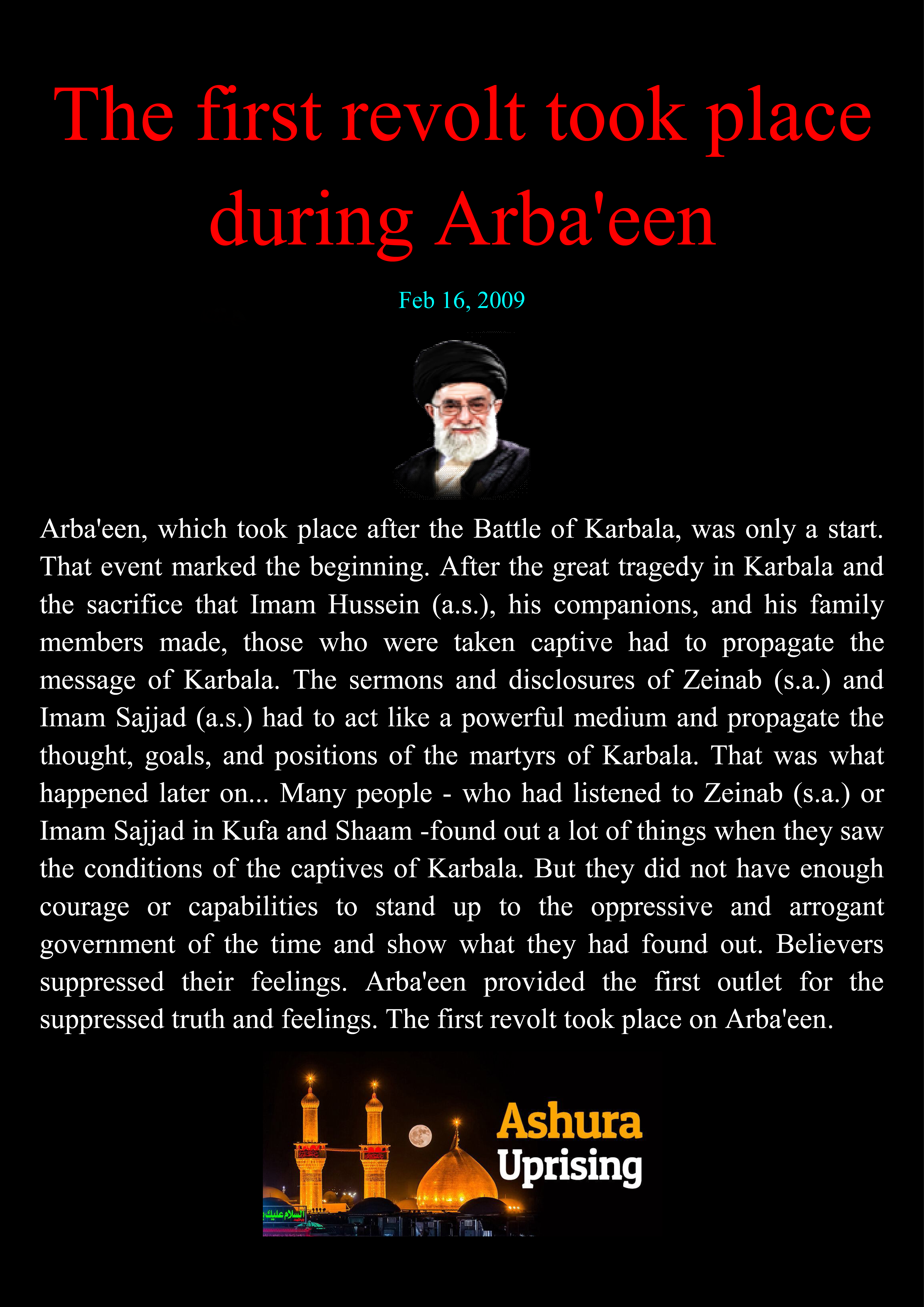
The first revolt took place during Arba'een
Feb 16, 2009
Arba'een, which took place after the Battle of Karbala, was only a start. That event marked the beginning. After the great tragedy in Karbala and the sacrifice that Imam Hussein (a.s.), his companions, and his family members made, those who were taken captive had to propagate the message of Karbala. The sermons and disclosures of Zeinab (s.a.) and Imam Sajjad (a.s.) had to act like a powerful medium and propagate the thought, goals, and positions of the martyrs of Karbala. That was what happened later on... Many people - who had listened to Zeinab (s.a.) or Imam Sajjad in Kufa and Shaam -found out a lot of things when they saw the conditions of the captives of Karbala. But they did not have enough courage or capabilities to stand up to the oppressive and arrogant government of the time and show what they had found out. Believers suppressed their feelings. Arba'een provided the first outlet for the suppressed truth and feelings. The first revolt took place on Arba'een.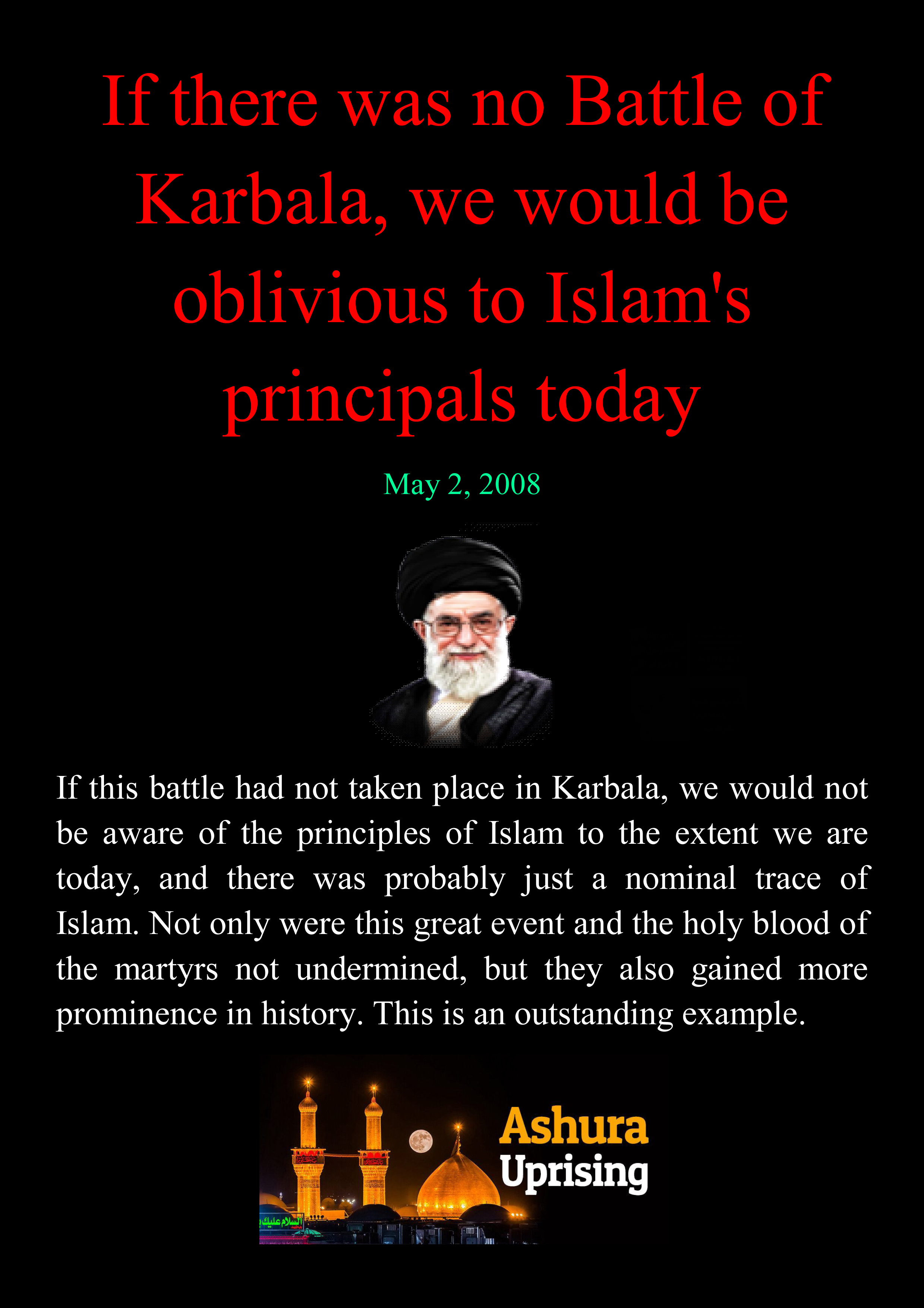
If there was no Battle of Karbala, we would be oblivious to Islam's principals today
May 2, 2008
If this battle had not taken place in Karbala, we would not be aware of the principles of Islam to the extent we are today, and there was probably just a nominal trace of Islam. Not only were this great event and the holy blood of the martyrs not undermined, but they also gained more prominence in history. This is an outstanding example
Why does Ashura, in contrast to other events in history, gains more vitality over time?
May 2, 2008
Some events are forgotten over time, like a weak wave created by throwing a pebble in a pool of water-- there is a wave, but as the time passes, it becomes weaker every moment and fades away in a short time. But, there are events the other way around; they do not fade away over time; rather, time makes them more prominent. One example is the event of Ashura.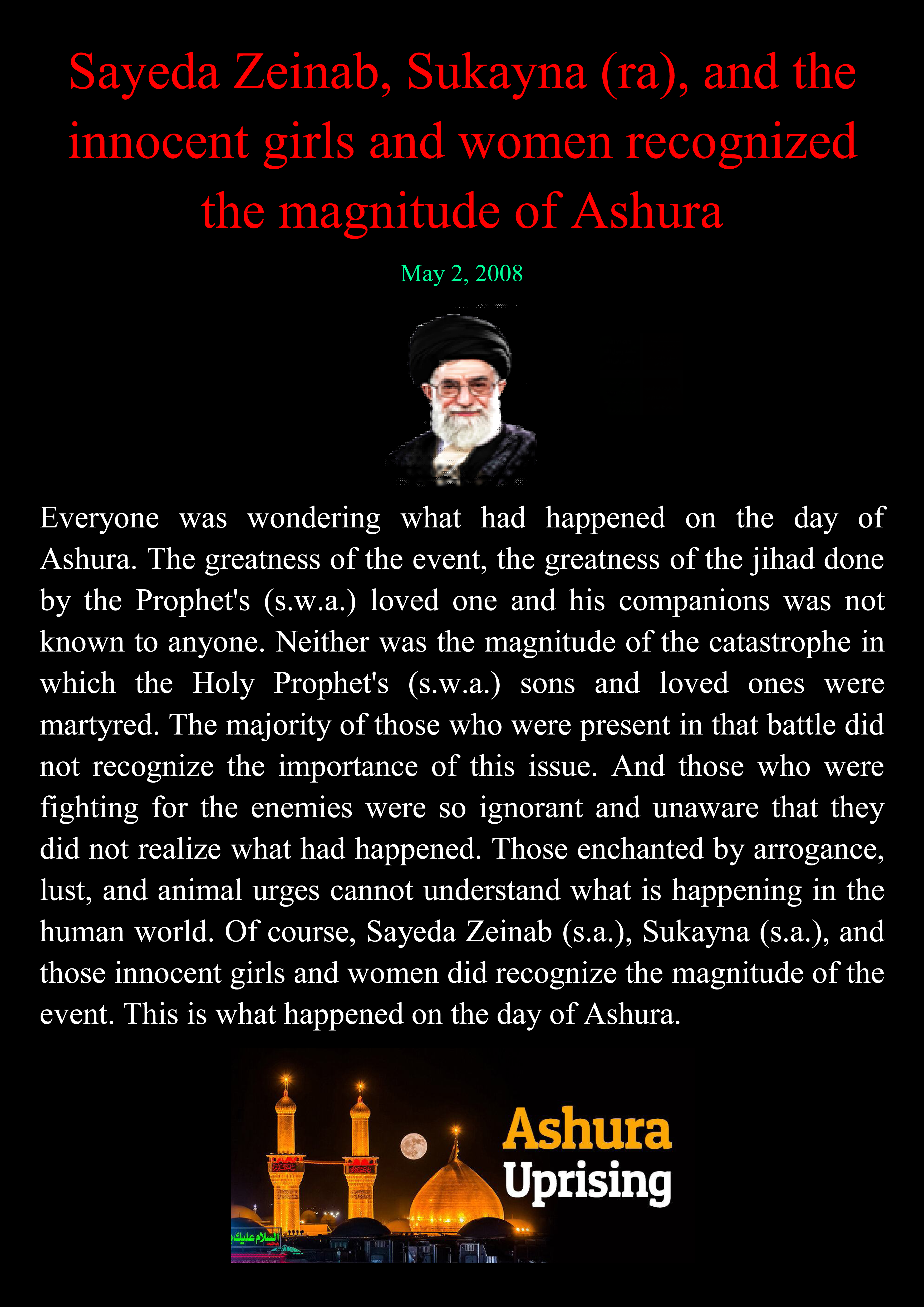
Sayeda Zeinab, Sukayna (ra), and the innocent girls and women recognized the magnitude of Ashura
May 2, 2008
Everyone was wondering what had happened on the day of Ashura. The greatness of the event, the greatness of the jihad done by the Prophet's (s.w.a.) loved one and his companions was not known to anyone. Neither was the magnitude of the catastrophe in which the Holy Prophet's (s.w.a.) sons and loved ones were martyred. The majority of those who were present in that battle did not recognize the importance of this issue. And those who were fighting for the enemies were so ignorant and unaware that they did not realize what had happened. Those enchanted by arrogance, lust, and animal urges cannot understand what is happening in the human world. Of course, Sayeda Zeinab (s.a.), Sukayna (s.a.), and those innocent girls and women did recognize the magnitude of the event. This is what happened on the day of Ashura.
Imam Hussain (a.s.) can be a role model for the world’s freedom seekers and justice seekers
Apr 14, 2000
Those who are not familiar with Islam but understand the concepts of freedom, justice, dignity, elevation and lofty human values, consider Imam Hussein (a.s.) as their Imam [leader] in seeking freedom, in seeking justice, in the fight against viciousness, and against ignorance and human degradation.
Imam Hussein's uprising was for the sake of God and a lesson of love and compassion
May 8, 1998
It is the lessons of Ashura which always live on as eternal, and permanent debates, not confined to a specific time. The lesson we learn from Ashura is the lesson of sacrifice and religiosity, the lesson of courage, justice and the lesson of rising up for God’s cause, and the lesson of love and compassion.
The west is in search of a lost treasure whose ultimate value is hidden in Ashura
May 24, 1995
One of our own Iranian thinkers had said—I heard that the person passed away— that "today the West is looking for figures like Sheikh Ansari and Mulla Sadra." Their life, spirituality and values attract western figures and western thinkers today. The source of all these treasures of truths and values is Islamic knowledge, and at the peak of this treasure of knowledge, is the knowledge of Ashura.
The Impact of Imam Hussein's Uprising on Justice and Freedom Movements
Jan 26, 1993
Hussein Ibn Ali (a.s.) awakened the conscience of the people. So you see, after the martyrdom of Imam Hussein (a.s.), Islamic uprisings were launched one after another. Of course, they were suppressed, but it is not important if a movement is suppressed by the enemy. It is surely bitter, but more bitter than that, is when a society does not respond to the enemy. This is a great danger. With his uprising, Imam Hussein Ibn Ali (a.s.) inspired individuals in all eras of the rule of tyrannies, to fight against oppressive and corrupt establishments with a willpower stronger than those of the time of Imam Hassan al-Mujtaba (a.s.)—even though they lived farther from the early years of Islam. And they were all suppressed. From the case of the uprising of the people of Medina, known as "Harreh", to the subsequent cases of Tawabin and Mokhtar uprisings, to the time of Umayyad and Bani Abbas, there were repeatedly uprisings within the nations. Who inspired these uprisings?If Imam Hussein (a.s.) had not risen up, would the spirit of laziness and irresponsibility change into the spirit of oppression-countering and responsibility? Why do we say the spirit of responsibility had died? Because Imam Hussein went to Mecca from Medina, the center of the nobles of Islam. The son of Abbas, the son of Zubair, the son of Omar, the son of early caliphs of Islam, all gathered in Medina, and no one of them was willing to help Imam Hussein (a.s.) in that bloody and historic uprising. So, before the launching of Imam Hussein's uprising, even the elites were not ready to take a step. But after the uprising of Imam Hussein (a.s.), this spirit was aroused. This is a great lesson to be learned from the event of Ashura, along with other lessons.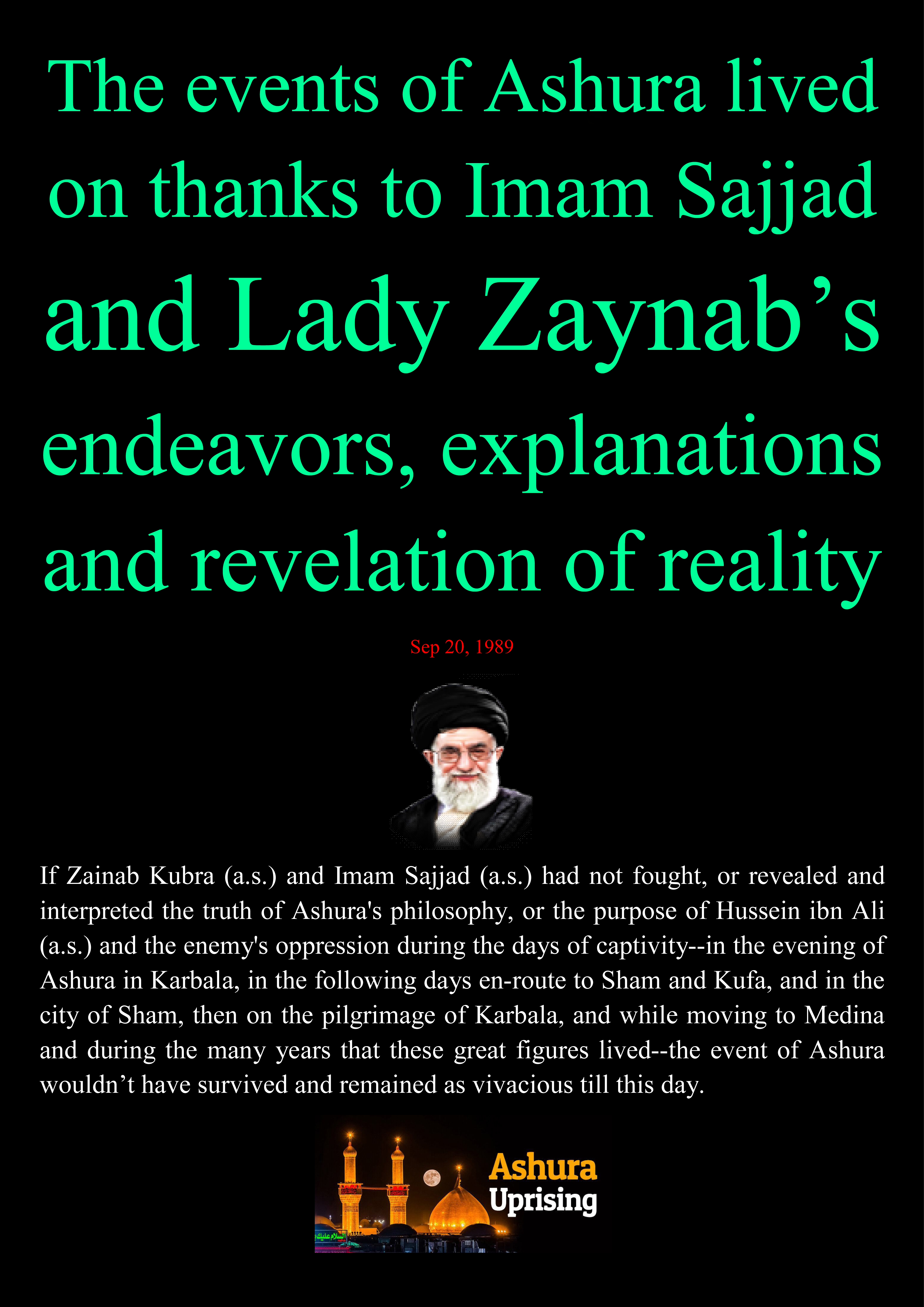
The events of Ashura lived on thanks to Imam Sajjad and Lady Zaynab’s endeavors, explanations and revelation of reality
Sep 20, 1989
If Zainab Kubra (a.s.) and Imam Sajjad (a.s.) had not fought, or revealed and interpreted the truth of Ashura's philosophy, or the purpose of Hussein ibn Ali (a.s.) and the enemy's oppression during the days of captivity--in the evening of Ashura in Karbala, in the following days en-route to Sham and Kufa, and in the city of Sham, then on the pilgrimage of Karbala, and while moving to Medina and during the many years that these great figures lived--the event of Ashura wouldn’t have survived and remained as vivacious till this day.
Imam Hussain’s uprising against corrupt regimes, destructive to mankind
Aug 2, 1989
That noble man [Imam Hussein] rose up to eliminate from societies corrupt regimes that are destructive to mankind, religion and righteousness and to establish an Islamic, divine and humane and upright system in society.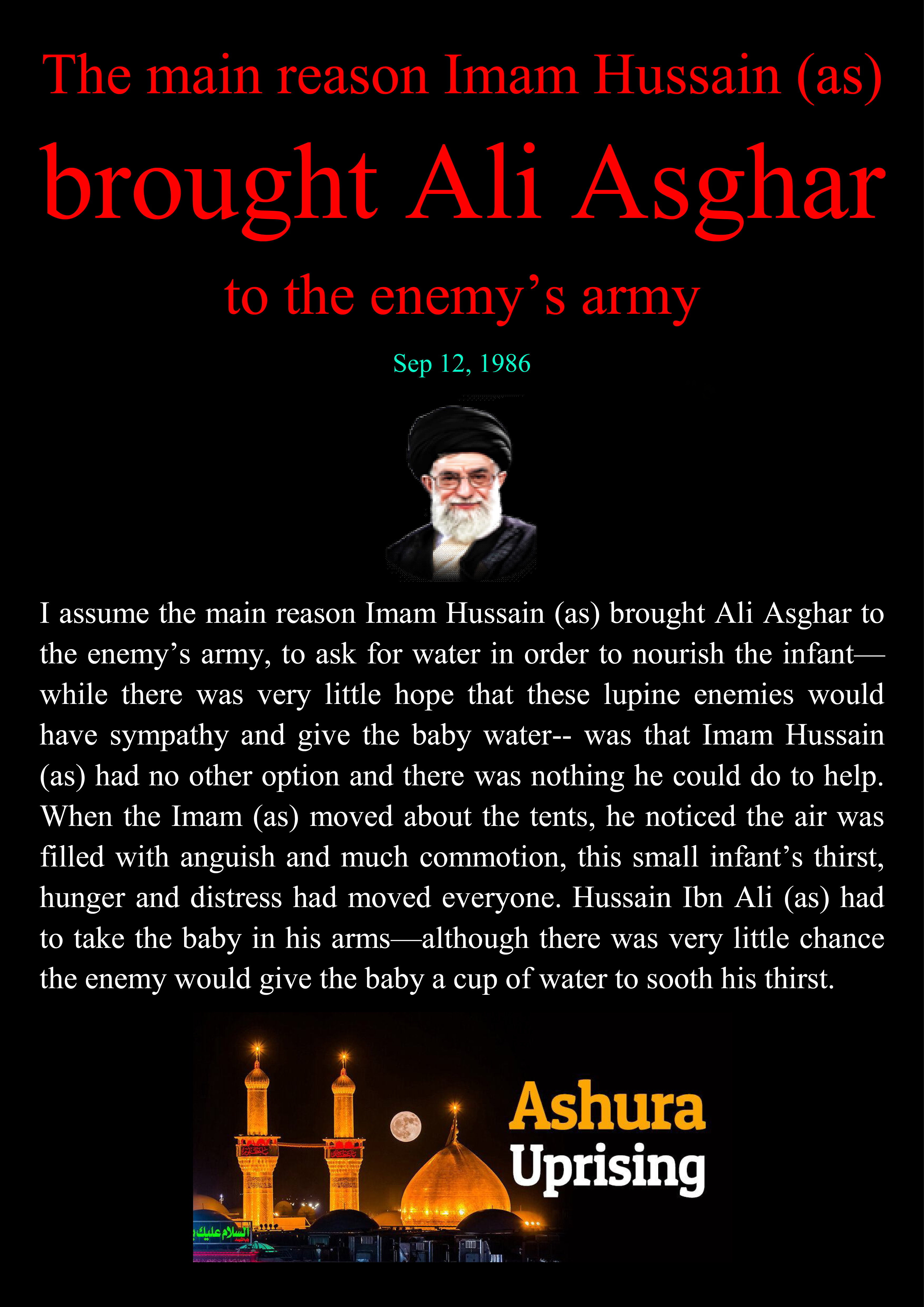
The main reason Imam Hussain (as) brought Ali Asghar to the enemy’s army
Sep 12, 1986
I assume the main reason Imam Hussain (as) brought Ali Asghar to the enemy’s army, to ask for water in order to nourish the infant—while there was very little hope that these lupine enemies would have sympathy and give the baby water-- was that Imam Hussain (as) had no other option and there was nothing he could do to help. When the Imam (as) moved about the tents, he noticed the air was filled with anguish and much commotion, this small infant’s thirst, hunger and distress had moved everyone. Hussain Ibn Ali (as) had to take the baby in his arms—although there was very little chance the enemy would give the baby a cup of water to sooth his thirst.
What was Hazrat Zeinab's reaction upon seeing her brother's bloodied body?
Sep 27, 1985
Hazrat Zeinab was heading the women towards the sight of his martyrdom. When she arrived, she spotted the body of her beloved brother on the blistering grounds of Karbala. Instead of revealing some sort of reaction, or grievance, she went to the corpse of her beloved Hussain (as), and called on her grandfather (pbuh). She said, “O’ the Messenger of God, peace be upon you! Take a look at your Hussain who is covered in blood, with his body hacked up.” O’ my dear grandfather! O’ Great Prophet, look towards the hot desert of Karbala. This is your Hussain who is now covered in blood and dust. Then, as it has been narrated, Zeinab (as) reached her hands beneath the body of Hussain Ibn Ali (as) and called out, “O’ God! Please accept this sacrifice from the progeny of Muhammad (saw)!”
Source:
https://english.khamenei.ir/Opinions/AshuraUprising
Links:
Who is Imam Hussain? Why did he launch an uprising?
Imam Hussain’s Revolution for Humanity
Note: All content is free to use
_zarh.jpg)
_3go9.jpg)
